#I've been trying to write a more nuanced post on this for some time but you know what this is the main takeaway from it
Text
Just because someone doesn't end up being a system doesn't mean their trauma wasn't "bad enough"
#actually dissociative#actually traumagenic#osdd 1#did osdd#dissociative identity disorder#system stuff#actually osdd#actually did#I've been trying to write a more nuanced post on this for some time but you know what this is the main takeaway from it#the irony of posting into system tags for this isn't lost on me#but i think enough questioning people or people going through denial look through them enough for it to count
52 notes
·
View notes
Text
not even gonna tag this properly bc i don't wanna get Involved but i do have some Thoughts i need to get out into the void so here we go
(aaa quick edit: CW for mention/discussion of Boothill leaks)
#today's gone Badly and i'm upset but instead of venting abt it i'm gonna channel that energy into doing a bit of tag rambling abt Boothill#well. less abt Him and more abt uh. self-analyzing my anxiety surrounding contributing to fandoms. he's just today's catalyst#like. i know it's mostly a me thing. i'm hypersensitive to criticism and very conflict avoidant + socially anxious + perfectionistic etc.#so I'm the one that keeps myself from posting more stuff out of fear of being criticized or called-out for what i've made#bc inevitably Someone's gonna see it and think its OOC or a problematic take or they'll misread my intent. etc etc what have you#but like. that's inevitable. there's no way to communicate every single thing with all of the nuance required to avoid misunderstandings#and other times it's not a misunderstanding it's just a difference of opinions and that's Fine!! there's no accounting for personal taste#there's no accounting for several things actually. taste‚ bias‚ lore-knowledge‚ differing levels of chronic-online-ness‚ etc#so this isn't me complaining abt the state of fandom culture (although i do think. sometimes. ppl take shit a bit too seriously)#but anyways all of this is mostly just anxiety-fueled. it's not like i very often actually even receive negative feedback or anything#if anything ppl tend to tell me that i'm overthinking it and killing my own fun and worried that my stuff is more OOC than it is#which like. yeah. Yeah u right :) but that's just the way that i am! always losing the idgaf war i suppose#anyways what's Boothill got to do w this ur wondering. well. i've been thinking abt the quickly emerging concept that he's illiterate.#and it just. has me feeling a lot of ways. and watching ppl disagree over it has me feeling some Bad ways. bc it's def a loaded topic!#if you'll pardon the pun there. and i don't rlly have anything new to add other than that i'm conflicted abt it.#like yeah i saw the leaks days ago. of him mentioning 'not hitting the books' much as a child when we ask him why he sends voice messages#or voice Transcriptions ig. ykwim. and like. *braces for impact* ...i liked it? like. it doesn't feel right to call it endearing#i'm not trying to infantilize him. ok that's not the right word either but ugh. you know? what i mean?? who am i kidding even i don't know#it's not quite right to say that it feels like Representation either. but it's something close i guess#as a southern person myself who didn't receive a 'complete' education due to factors that weren't to do with my intelligence#the concept of seeing him as a capable force to be reckoned with and respected who also happens to have not received much formal education#i like that. i do. but there's so many issues w it at the same time. like. as i said‚ being southern myself has me Wary of the way Hoyo is-#writing him. as well as of the way that the fandom is taking the bits of his lore and running away w them. and i'm Very aware of how ppl-#will see a southern character and be All Too Eager to agree that they're lacking intelligence based on our Redneck™ stereotype#sigh. and before we even go too far with this. it's not even confirmed that hes completely illiterate. which is a valid criticism i've seen#there's Multiple reasons that could make him prefer voice to text. but regardless. i'm just worried that ppl will misconstrue my intentions#like. example: that edit i made the other day of him saying 'no thanks i can't read'. wasn't me playing into the stereotype of-#'haha dumb country boy can't read!' it was. in my eyes. something he'd say as a joke to make light of a potential insecurity#like. i think there's far more depth to Boothill's character if ppl could look past the surface. and i dont wanna contribute to the problem#but sometimes ppl Will have stereotypical traits and i wish the same could apply to characters as long as it's done Thoughtfully.
13 notes
·
View notes
Note
Hi! I'm very interested in attempting to write a disabled character (not for this blog, I assure, for an book I'm writing) in which the story doesn't fetishize/objectify her prosthetic limb. I'm in many writing circles and have been for a long while, but I've never seen this issue brought to light which I realise is a very important one. I have much to change in my thought process, and thank you for bringing this issue to attention.
I'm curious, and I apologise if this has been asked before, but what sort of design could you see for a functional prosthetic that doesn't go for a plainly aesthetic appearance, or is soully to please others? I do note that you said prosthetics are generally... not that helpful. So is there a way that it could be? Or do you think it would always generally be better to not use a prosthetic, as its mostly for aesthetic purposes, as you said?
I apologise if this ask is too outright or anything, and I don't mean to intrude. Thank you for your time and have a beautiful day!
okay, i want to answer this as in depth as possible, because whenever i talk about having a prosthesis, someone will always tag some variation of "#writing reference" and i do wonder what message they're taking away, and i want to get as much of my experience out as possible to maybe help shape how this is all portrayed in the future. and yeah… this is gonna be one of those rambly smg posts that the expand feature was invented for, so i'll start with the very abridged TL;DR:
if you're writing a character with an upper limb prosthesis; don't. arm amputees are unicorn level rare even compared to leg amputees, and i've never interacted with or even heard of an upper limb amputee that regularly uses a prosthesis, let alone relies on one. fiction has lied to you for the sake of cool aesthetics, don't repeat the cycle. more in depth writing advice including nuance and "but i waaaant to" will follow.
that said, grab your donning parachute and let's get started...
context for everyone involved: i am an upper limb amputee that rants a lot about how prostheses suck, i lost my right hand roughly five years ago at roughly the age of 30 after a very rough decline in health… it was pretty rough. this question is being asked in the context of a previous rant post of mine, and i checked that the ask is about an upper limb prosthesis in particular.
the situation regarding the usefulness of lower limb prostheses is totally different; i am definitely no expert, but by all accounts, prosthetic legs are incredibly useful for many people. getting a good leg can be absolutely life changing and more or less necessary for day to day life for some; mostly because infrastructure and society is just so fucking hostile to wheelchair users. being able to walk - at the cost of pressure sores and rashes and increased residual limb pain - is a preferable option to many people than being unable to fit through a doorway or in a bathroom stall or find out that the key to unlock the only elevator is in the admin office up three flights of stairs (true story).
but upper limb prostheses… see, the thing is, hands are incredibly complex organs that rely on a lot of immediate haptic feedback to work at all. hand dexterity is all about control, you need fine granular movements of the digits yes, but you also need the subtle sensations of pressure and proprioception in order to adjust your movements on the fly. i speak from experience, in the years leading up to the full loss of my hand, i was slowly losing function of it, usually swinging between numbness that made it clumsy at best, or screaming overstimulation from moving it at all resulting in unpredictable spasms… and let me tell you, a half working hand is infuriating to try and deal with. you can never know if you have a good grip on something or if it's slipping because of the wrong amount of pressure, and there's only so many smashed bottles of pickles on the floor before you give up using it all together… so amputation wasn't a great loss there, i had time to adapt.
a prosthetic hand of any kind has all of those issues and more. they're heavy and bulky, the cosmetic faux fingers or gripping claw have crude movement at best, and there's zero feedback (put a pin in this). 100% of the time you're using a prosthetic hand you have to keep your eyes on the grip and visually guesstimate whether or not the thing you're carrying is held tight enough but not too tight, that is if your "heavy duty" prosthesis can even support the weight without the servos disengaging or the wrist attachment socket just busting loose. i dropped a whippersnipper on my foot last week when my socket couldn't take the weight and i think that was the final straw in me desperately trying to prove to myself that there is a single task my prosthesis actually helps with.
this is usually where fully two handed people start talking about bleeding edge DARPA tech, and how we just need to invest more,research more, develop more. better tech, more tech, neural integration, more more more. okay i promise the writing advice is coming! for starters on tech, my experience is already with a mid-to-high end ottobock terminal device: i've got a myoelectric nerve-signal operated proportional control heavy duty greifer; about the only upgrade left for me to get would be a rotating wrist joint if i could coflex. it's not military, it's not "rockclimber that owns a prosthetic company", but it's quality tech. it still fucking sucks. secondly, that high level military tech exists primary for PR purposes so they can say they treat their discarded casualties well, "we can rebuild him, we have the technology" style. every war vet i've read about or heard from that's been gifted that high level tech also abandons it for the same reasons; it's imprecise, there's no feedback (or the haptic interface has to be fully recalibrated every time they put it on), but mostly they're more capable without one.
okay, the transhumanist ableds say (i should know, i used to be one), what if we did more ~research and development~ and got that neural feedback working? then we could have fireproof superhumanly strong robot arms to fix up everyone! here's where i take out that pin we put up before and i tell you that a class of prosthetic arms/hands already exists that has perfect proportional control, fine motor control, and physics perfect pressure feedback piped directly into the patients' existing sensory systems! they're called body-powered prostheses, and they were invented in like the 1600s. you strap a whole bunch of stuff to your arm and shoulders shoulders, and control the operation of the terminal device and elbow through cable tension by flexing your shoulders. they do take a considerable amount of training to operate - though hell i spent 18 months training to use my myo - but based on everything i've read, body-powered prostheses are the best option if you're an upper limb amputee and absolutely need a second hand for some reason.
but they don't look cool and futuristic, and according to my prosthetist, most people give up on using them too. we all give up on our prostheses, no matter the type. my rehab OT was impressed i lasted the 18 months of my training. towards the end, they even asked if the clinic director could drop in to one of my sessions to see my progress; he expressed genuine amazement at me casually using my bulky robot claw to use a brush and dustpan, and made an offhanded (hah) comment about what someone can achieve "if they stick it out to the end", implying it was somewhat of a rarity for me to have done so. several years on, and yesterday i wedged the dustpan between my ankles to sweep up into it, awkward but exponentially less effort than putting my dusty robot arm on. which, by the way, is a whole thing. look up some videos, they're all awful to don. i don't actually know the official technical name of what my clinic calls a "parachute" but it's a bitch to use! have you ever tried to pull back with your arm whilst also pushing it forwards at the same time, and simultaneously lean in to and away from an external force pulling on you? that's how you get a myo socket on.
bare with me, i promise writing advice is coming, and i promise it's more than the tl;dr. but. remember when i said a half working hand is infuriating to deal with? any prosthesis, from fancy myo tech to pirate-era body powered, will only ever be half as good as a working hand, and being juuuust within capability to do something but not quite able to is maddening! but you know what works way better than a half working hand? no hand at all. using whatever residual/vestigial limb you have - whatever "stump" you have, i hate that word - is pretty much always better than trying to use a prosthesis. i can use the inside of my elbow to grip and carry things, i can use the nub of my arm to apply pressure to hold things, open doors, use a computer mouse, turn on taps and lights, if i put a glove over it i can use it to prep for cooking. i have full proprioception and pressure feedback with skin contact, i don't think i've ever dropped and broken anything from my elbow, unlike countless things slipped from my greifer - which, by the way, absolutely will start clenching as tight as it can if i get even slightly too sweaty around the electrodes, which has both broken things i'm holding and also injured me, because surprise surprise but servo operated robot claws have pinch points on them right near the "emergency disengage" lever for some reason!
but i am exponentially more capable without it on than with it. no, i'm not fully independent, i rely on housemates and loved ones to help me out with some tasks that simply just need two handed dexterity, but none of those tasks are things a prosthesis makes me able to do anyway. i used to imagine my prosthesis would be like a bra; a bit awkward and uncomfortable, but i'd wear it throughout the day because it's helpful and take it off in the evening to decompress. in reality it's actually exactly like a bra: an absolute bitch to put on one handed, unbearably uncomfortable because it never sits right, ugly af unless you're a millionaire, and absolutely useless except for the fact that i get gawked at and judged by strangers if i leave the house without it on.
and if you really want to discover how far "no hand is better than a half working hand" goes, brace yourself, and look up the patient's stories (not medical system stories) of people that have had hand transplants. the first man to receive one hated it, he was promised a return to normal function, and what he got was a nightmare worse than being one handed; he wanted it removed again but the doctors refused because it would undermine their grand achievement of the first hand transplant. the doctors and society wanted him to be fixed, they wanted him to be normal, they wanted him to be abled. they failed. they made him less able to do things, denied his autonomy, and left him with someone else's hand slowly rotting on him, prioritising the idea of "scientific progress" and "two hands good" over the physical health, mental health, and ability to function of this man.
he's not alone; every story from the patients' perspective about hand transplants that i've read goes this way, including a woman who was born quad limb different and was promised hands would improve her life, pressured into a double hand transplant, only to find herself after the surgery essentially experiencing disability for the first time ever, because she had lived her whole life getting by just fine with her 'underdeveloped' limbs, but half working hands are worse than useless. you can try to find these stories yourself, but i'm not going looking for sources on any of these cases, because if you look back through enough of my posts you'll get a glimpse of the horrors and abuses that i too was put through by doctors who prioritised trying to "fix" me at any cost, rather than providing me the best quality of life, and in turn traumatised me and left me more broken than any loss of limb on its own could. dear goddess, i promise the writing advice is coming.
so. why do upper limb prostheses exist at all? if they're so terrible and useless, what is their function? i want to borrow something someone else left in the tags of a previous rant here, from someone who i believe works in prosthetics and/or rehab, cleaned up and anonymised at their request:
"upper limb functions are wildly more complex than: 1) bear weight static, and 2) bear weight moving.
but every single upper limb amputee i know has a fancy expensive prosthetic just gathering dust in the closet because there is literally nothing it can do like a few years of adjustment and if needed non-dominant hand retraining can't do.
the existence of forquarter prosthetics to begin with is just kind of silly and useless and entirely to make OTHER people feel comfortable, especially considering they universally are UNcomfortable for the amputee.
i hate the notion that as soon as you get the amputation the prosthetic is The Thing That Will Fix You And Make You Feel Normal again because it universally isn't!
but every forequarter person i know had like this ideal of Being Fixed By Magic Prosthetic that they were then obviously wildly disappointed by and had to do yet another grieving process with, versus if the dominant narrative were just one of: yeah. it'll take time, there is no magic fix."
and i think that really nails down what the actual purpose of upper limb prostheses is: they're not for the user, they're for the sake of other people. and not just their comfort when looking at our bodies, although based on the pressure for both amputees and people born limb different to get functionless cosmetic plastic hands, there is a lot of that. but it's not just that.
i fully believe that the reason prosthetic hands exists is to comfort the fears of the two handed. "don't worry", they say, "we can fix you again. you don't have to fear becoming Disabled, you don't have to worry about adapting or your life changing. we can make you Normal™ again."
you would not believe the number of people that have approached me to shower me with pity, to tell me how horrific my life is, how they can't imagine it. people have told me, apropos of nothing, that they'd kill themselves if they lost a hand. indirectly, that my life isn't worth living. unless, of course, i happen to be wearing my cool as fuck looking robot prosthesis! then they tell me how wonderful it is, how lucky i am, how glad they are that we have the technology to fix me. that's what a prosthetic hand says, what all the happy fishing photos on limbs4life posters at the rehab clinic say: don't worry, we can fix you. that's what the bleeding edge DARPA flexi-whatever fully articulated neuro-feedback hands say: don't worry if you get IED'd while hunting civilians for us to drone bomb, if you get hurt, we will fix you, we will fix the fuck out of you, we will motherfucking adam jensen you into a cool as fuck cyborg that your son will idolise; come on boys, don't you wanna enlist just for the chance at being as cool as this? join the bomb squad for a ticket to the upgrade lottery.
and so we arrive at fiction. as much as his dialogue options protest, adam jensen loves his robot arms, they punch through walls, turn into fucking swords! they make him the most special man in the world. what would he do without them? learn to cope? grieve? practice acceptance? take up poetry? just, be disabled? there's no power fantasy for ableds in that.
in fact, can you think of a single fictional character that's an upper limb amputee that's, well, just an amputee? they all have robot arms. not realistic prostheses, not medical devices; robot arms. sleek or bulky, top of the line or broken down self built, steampunk or nanomachines or magitech automail; they're never without them. never just an amputee. never born limb different either! there's always that element of tragedy to overcome, always suffering and misery porn, always focus on the pain and the helplessness without the absolutely vital robot arm that makes them Normal and Whole. the closest amputee example i can think of is furiosa from mad max, who iirc fucking punches max in the face with her residual limb like a motherfucking badass! i can barely lean on mine wrong and she punches a guy! but she still apparently needs a dieselpunk robot hand to drive a truck, something you can do one handed so easily most drivers don't even notice they're doing it! please don't, by the way
and so many disabled fans love to point to robot armed characters as disability representation; the winter soldier, luke skywalker, edward elric, misty knight, that genderswapped furry girl from ratchet and clank, jet cowboybebop, finn the human, and yes, adam jensen…. these are all characters that someone disabled i know has told me they love because they "represent disabled bodies"…. and i know nobody wants to hear this, because i've been screamed at for saying it before, but… they do not. they are not disabled, functionally or within fiction. they are either perfectly able bodied Normal people with chrome paint on an arm, or tortured misery porn we are supposed to pity and feel lucky we're not them. sometimes both!
also you ever notice how it's basically always arms? lower limb amputations are orders of magnitude more common than upper, my prosthetist said i was probably only the 4th or 5th upper limb she'd worked with in her career, with literally hundreds of lower limb fits. but fiction doesn't seem to reflect that, huh? or any other part of the reality of disability. it's always cool as fuck robot arms, never cool as fuck wheelchairs or crutches or dialysis machines or colostomy bags. a fair few "i was blind but now i can see with Robot Eyes and also infrared and xray" around, which again, plays into that "we can fix you and make you cooler" propaganda.
by the way, up above when i was describing body powered arms, if you wondered to yourself why i went with a myoelectric one instead when i clearly believe body powered is better… yeah. i am not immune to propaganda! i too wanted to be cool as fuck. i spent years with deteriorating function in my hand for reasons that are still unknown, was misdiagnosed and medically neglected to the point that removing my hand seemed to be the only option left to offer some relief, and even that was a clusterfuck that left me worse than ever… of course i wanted to believe in the power and prestige of a cool robot arm that fiction promised me.
but fiction promises fantastical lies. and so.
we get to the writing advice portion of the novella that is this post. you asked for advice on how to write a disabled character with an upper limb prosthesis. you've read the tl;dr, you've read everything above i assume, you know i don't want you to do it. the obvious twist is that it's been writing advice all along, me trying to share my perspective on what it's like being an amp with a robot arm and how shitty it is, implying how almost any fully realised and realistic character that's missing an upper limb would give up on a prosthesis at all. you can already tell that every value judgement in me says "don't give her a prosthesis, no matter how functional or cool you make it. don't try to make the tech better to justify it, just let her be one armed, one handed. just let her be disabled, but not helpless. let her show off her elbow or underarm carry strength. let her love interest appreciate how soft and squishy her residual limb is in a moment of tenderness. let her natural disabled body be respected and valued."
but that's a personal value judgement from me, and you are the author of your own work. i know it's trite to say, but you are! even the act of deferring to someone with lived experience in the hope of doing a better job at representation is a value judgement, a good choice in my opinion, but one you needn't necessarily take. maybe you do want to write a character that has a cool as fuck unrealistic robot arm as a power fantasy, or a comfort blanket… i did.
i've been slowly writing my own probably terrible scifi epic for over a decade now, and when my arm was giving me hell back then, i'd take great comfort in this fantasy of my protagonist with her chunky robot arm, the terrible traumatic suffering of her loss, overcoming, the power and ability her advanced prosthesis gives her over others, that she alone has access to, because others are not willing to make the sacrifices required. inspiration porn. awful stuff to me now, but empowering to me then. as i grew and gained direct experience, i slowly reimagined her, rewrote her, ship of theseus'd her into an entirely new character; a reflection of me now, bitter at the whole thing, spiteful that her natural flesh arm evokes fear and distrust, but unwilling to suffer the pain and frustration of her unnatural prosthesis just to make others comfortable and respect her as "whole", however artificial that whole is. and as with the ship of theseus being two ships, once i realised the transformation, i re-added the old protagonist back in whole cloth as a separate character; proud of her robot arm and its power, but in new context, as a foil and antagonist, an in-universe military prosthesis propaganda figure to reflect how i now feel characters like her exist to us, the readers.
i'm not just sharing that as egotistical self promotion, but to highlight that, even if i sit here begging you all up and down not to write characters with robot arms for how bad and unrealistic they are; there's still something genuine and true that their inclusion can say. the great thing about the story that you're writing is that only you can write it, as they say. but i whole heartedly believe that to write to your best, you have to be aware of what you're writing and why. as tempting as it is to feel these characters form naturally in us and therefore we're averse to changing traits about them that feel organic and self evident; as authors we have omnipotent control over the text, every trait and detail is a reflection on us, so we'd sure as hell better understand why we're choosing to write a character with this trait. because anything you write without being aware of intent will take on its own meaning in the space between.
and on that note, if i don't say this, i'm leaving it to be inferred: i definitely don't want to appear to come down on the side of saying "you cannot write an amputee unless you are one", because we are rarer than single young bisexual unicorns! and it would be a tragedy if anyone read through all this and then turned away in fear, deciding to never write an amputee character (with or without robot arm) because they feel they can't do it justice… believe me, no matter what anyone says, some hack writer somewhere is going to keep writing adam jensens and winter soldiers. don't let them be the only voices in fiction! just try to do your best.
so my ultimate advice on the topic of writing a character with a prosthetic limb is to ask yourself one question in two different frameworks, and meditate on what you feel the answer is:
why does she have a prosthesis?
from a doylelist perspective as the kids say, as an author with omnipotent control, why are you choosing to write about this topic? why are you choosing to give this trait to this character? what does it say about how you view ability and disability, what makes a person normal, and what our society values? will you let her be in her natural body? or will you give her a prosthesis, force her to wear it by authorial fiat, or author her a meaningful reason to choose to? if yes, be sure you know; why did you give her a prosthesis?
and from a wastonian perspective, diegetically, inside the story, why does she choose to wear a prosthesis? what does it say about her inner character, and how she interacts with the world? how does she feel about doing it, is she prideful and loves the attention she gets, or does she resent whatever necessitates its use? how do people in this world view ability and disability, what does this society value? and above all, whatever the answer to these questions, whether or not she uses a prosthesis or is badass without one, how does she deal with the eternal freezing cold that every amputee ever feels constantly in their residual limb and why does nobody make a heat pack that fits over a nub without drafty gaps???
i can't outright tell you how to write a good upper limb amputee, but if you at least know why you're writing one and for what purpose, you're on track to write the best character that you can. that's the best advice i can give… other than, like, this whole rambly mess.
and, as a reward for reading this far, please have a very blurry cryptid photo of my cat doing his old man sit:

9K notes
·
View notes
Text
Warhorses: Which horses are actually good candidates, anyway?
This post is in honor of @warrioreowynofrohan, who asked the question in the comments under my guide, "Horses: Since There Seems To Be A Knowledge Gap". Their question, "Given what you said about too much weight breaking a horse’s spine, how did that work with knights in plate armour?" is one I'm going to try to answer here, since the answer can be very nuanced depending on where and when you're talking about.
Also, while I was a stable hand for years as well as a rider, I never had the opportunity to directly learn more ancient styles of tacking, horse training, and combat, so I don't have any direct experience to draw from with regard to horses used for military purposes. I'm still gonna do my best here with what I know, and research what I don't.
As I've covered in the past, large horses (draft horses) make less-than-ideal warhorses, and so do carriage horses like the elegant and dramatic Friesians.
Let's begin by addressing this from the perspective of creative writing. For you writers and content creators out there, an essential part to the continuity of any historically-themed work you do involving horses will be depicting breeds of horses that didn't exist before a certain time in history. I'm going to approach this question from the stance of, "Medieval-type era warhorses". Horses were used in warfare as late was World War II, but actual horses you ride into battle with knights and archers and bannermen? We actually have to drop the subject of specific modern breeds altogether aside from using them for comparisons.
When discussing warhorses, various cultures have approached them differently. Some cultures will value a specific type of horse above all others, such as the Mongolian Steppe Horse or the American Mustang. Other cultures, which may be from biomes and territories where multiple types of horses are needed for different forms of warfare and tactics, value whichever horses can get their jobs done without their riders getting killed.
Carrying vs. Pulling:
Horses have been used in warfare since as far back as 4000 BC, but their first applications were more as chariot horses. Humans have been riding and working with horses since before we even had stirrups to more easily ride them with! As archaeologists and anthropologists make more discoveries, the more we learn that we humans have been working closely with horses since before we had specialized tools to ride them with. The very first warhorses pulled chariots or carts, which is much easier for a horse's anatomy to handle compared to carrying a heavy weight like an armored rider on their backs, which puts stress directly on their spines where they have very little supporting muscle for supporting a lot of heavy downward weight.
Warhorse Size Categories:
Really, any breed of horse can apply to a niche in warfare if it's needed enough. Even very small, delicate horses have had their place in the history of human combat! Before I continue, it's important to know that there's a unique unit of measuring a horse's height. Rather than measuring a horse's height in centimeters or inches, they're measured in units called "hands". A single "hand" = ~4 inches/10.16cm, and a horse's height is measured based upon the distance between the bottom of their hoof to the tallest part of their shoulders, just at the base of the back of their necks. We don't actually include neck length/head height in a horse's measurements with traditional measuring.
Another rule of thumb: The average horse cannot safely carry anything heavier than about 30% of their total body weight. This is a serious factor to take into mind when deciding on a type of or breed of horse for a mounted warrior of any kind: You need to factor in the OC's starting body weight, and then add on the weight of armor, weapons, and any armor the horse itself may wear along with the weight of its tack.
Light-Weight Horses:
A few examples of lightweight horse breeds whose ancestors have historically been used in combat are Arabians, Barber Horses, and the magnificent Akhal-Teke. Lightweight and delicately-boned horses like those are best applied for military maneuvers that require precision, speed, and endurance, and the rider themselves should specialize in some form of combat or reconnaissance that doesn't require them to wear heavy metal or laminated armors. Archers are good candidates for riding smaller horses, or lightly-armored swordsmen like an Ottoman Janissary.
Central-Asian and North African horses also benefit from having a higher tolerance for hot climates. They can absolutely suffer from heatstroke and cardiac arrest from being forced to run and work in extreme temperatures and should always be provided with the same protective measures in a heatwave as any other horse, but they have a little bit of an edge over horses descended from freezing and temperate climates.
Medium-Weight Horses:
Medium-weight horses started showing up in the archaeological record around about the Iron Age, where chariot warfare was becoming an increasingly utilized form of mobile combat, and people needed bigger, stronger horses capable of pulling heavier loads - such as a chariot with two passengers rather than just one. As cultures began to develop heavier-duty armors made of metals and laminated materials, it also became important to breed horses that were tall and stocky (muscular and with relatively short spines compared to their height), and therefore more capable of carrying riders in increasingly heavy armor. Medium-weight horses were also essential at the dawn of the gunpowder age when the cannon came into use in siege warfare for pulling the heavy, iron cannons into position.
Medium-weight horses are really where we see the beginnings of knights and other warrior classes on horseback come into the forefront of warfare. When you have a horse that's big and strong enough to carry heavier armor and heavier weapons along with a rider wielding them, you have a much deadlier force at your disposal. Strikes from a sword or spear from the back of a galloping horse basically results in a sword capable of cutting through enemy soldiers like a hot knife through butter.
Important Note: Traditionally, cavalrymen wield blunt swords when attacking from a charging horse's back. When a horse is charging at full speed, the sharpness of a blade becomes less important than the blade's ability to stay in one piece when it impacts hard armor and bone. A blunted edge basically turns a cavalryman's sword into a thin club that's better at holding up against smashing through multiple layers of armor and bone compared to a thinner, more delicate sharpened edge that can shatter from a high-speed impact.
Heavy-Weight Horses:
The direct ancestors of modern draft horses, such as the Shire Horse, only began to appear around about the beginning of the European Medieval Era, and were far and away not even close to the enormous sizes of the draft horses we have today. Any horse counts as a "Heavy-weight" classed horse if its weight exceeds 1500lbs/680kgs.
Heavy-weight horses were really more bred for pulling enormous weights rather than carrying knights. While yeah, there is some evidence that suggests that heavy-weight horses were used by heavily-armored knights, historians argue a lot about whether it was a rule or an exception (such as with Henry VIII, who continued to ride well after he had begun to weigh more than 350lbs/158kgs, and even went to war in France in his final years on horseback). Generally speaking, medium-weight horses tend to be the right balance of agile and strong for carrying someone that's going to actively be fighting. Heavy-weight horses were bred to be a lot more tolerant to the chaos and frightening stimulation of the sounds of battle, but medium-weighted horses generally tended to be more suited to moving efficiently through dense packs of soldiers and weaving around other horses.
Ponies:
While actually being the smallest class of warhorse, ponies were essential when it came to carrying cargo and working as pack-horses. In certain forms of terrain, such as mountains, large horses pulling big carts full of supplies or soldiers could often be extremely impractical. In situations where an army needed to move on foot and form a narrow line in order to travel, ponies were able to traverse much narrower and rougher terrain while carrying smaller loads to their destination, when heavier horses would struggle more under their own weight and dexterity.
Europe-Specific Terminologies:
If you're a writer reading this and writing a piece set in the European Medieval age, there are specific terms used for the different classes I listed of warhorses above that I'm gonna list:
Destriers: The Destrier was a universal term for the iconic knight-carrying, jousting horse. They were also sometimes referred to as "Great Horses" due to their reputations in combat settings. Destriers could have just about any appearance, but were rarely taller than 15.2 hands, or 62inches/157cm. They were capable of carrying heavily-armored knights (although knights in full plate mail rarely rode into battle and stayed on the horse the entire time - they tended to specialize at grouping up and killing a lot of footsoldiers swarming them at once and preventing breaks in defenses from being overwhelmed by an oncoming army; in the case of Edward the Black Prince, we have substantial evidence in the form of his surviving brigandine that a mounted soldier or knight was more likely to wear chainmail and brigandine with a tabard on their body with their arms, feet, and heads the most heavily armored in plate when they intended to fight on horseback, making them a little lighter and more maneuverable, but I may be waaay off base there because I'm thinking of more of Italian soldiers who used full plate and how they applied it in battle more than any other example) and wearing armor themselves.
Interestingly, the sex of a destrier was often chosen strategically. Stallions (horses that haven't been neutered) are more aggressive, and could both act as combatants on their own if their knight was dismounted or killed, but could give away an army's location if they were attempting to move stealthily. Stallions whinny and shriek a lot when they're horny or arguing with each other, which is most of the time.
Mares were often chosen by Muslim armies for being much less vocal, and therefore much more capable of stealth. Geldings (neutered males) were the preferred mounts of the Teutonic Knights, a Catholic military group, since they couldn't be stolen and used to breed more horses for the enemy army.
Coursers:
Coursers were the most common Medieval European warhorse. It's important to remember that in Medieval Europe, most armies were almost entirely comprised of common men - serfs subject to the will of their landlords, not far removed from slaves in many ways - who couldn't afford the highly-prized and expensive Destriers. Coursers were usually a bit lighter than Destriers, but were still strong enough to carry someone wearing armor. Coursers were also a little more utilitarian, because they were also sometimes used in hunting as well as warfare, so they had a valuable use outside of warfare that the owner could benefit from.
Rouncey:
A rouncey was an all-purpose horse that could be used for leisure and travel-riding as well as be trained for war. They were a lot more likely to be found on the farm of a serf or independent farmer of some kind, as they could fill a lot of different roles depending on what they were needed for. Their sizes weren't really important as much as their ability to get the job done.
It's also critical to remember that, when talking about warhorses, we're usually talking about eras long past. In general, thanks to resource availability and incredible advances in medicine, modern humans are significantly taller, and therefore heavier, than people from the European Medieval era and prior. While fatness was valued in many cultures for its suggestion of wealth, most working-class and serf-class people worked intensely physically-demanding daily lives just to maintain their own homes. They were a few inches shorter on average than we are today, had greater fluctuations in body fat distribution depending on how harsh or bountiful the harvest season had been and the season in which a war was taking place (the average person's weight would swing by 30lbs or more on average every year prior to the industrial era), and cavalry were usually chosen based upon skill in the saddle as well as physical size when considering the application of medium or heavy armor being placed on the horse's back and body.
241 notes
·
View notes
Text
Worried About Traction/Why Write?
Anonymous asked: Okay answer me this, so I've read how trad publishing is going to shit, but self-publishing I doubt I could gain any traction with. Then why fucking write, ya know? People say, "write for yourself," which sounds like a lot of goody bullshit. I want people to love my writing, I need some type of validation.
So, how the hell do I get anyone to care about my stories?
Just a quick note that this ask came in off Anon, and I wasn't sure if it was meant to, so I put I'm posting it Anon to be on the safe side.
So, I don't want to get too much into the "is traditional publishing dying" debacle, because it's a conversation that's complex and nuanced and outside of my energy reserves at the moment. What I will say is that the traditional publishers--the Big Five in particular--still dominate the market, especially where print books are concerned. And although self-publishing can respond more quickly to trends and shifting tastes, traditional publishing continues to evolve.
Having said that, even if traditional publishing was stronger than ever before, that wouldn't guarantee you a book deal. Even in the best of times, the odds of being traditionally published are between 1 and 2%. Even if you get a book deal, that doesn't guarantee your book will be a best-seller. Hundreds of thousands of books are traditionally published every year, and far fewer than 1% of those books will become best sellers. Being traditionally published doesn't even guarantee your book will be sold in brick and mortar bookstores. I can point you toward traditionally published books that have been out almost a year and still have fewer than 10 reviews on Amazon. I can point you toward many more with fewer than 30.
And, while we're on the subject, I can show you self-published books with thousands of reviews (positive ones, btw...)
The point is, it doesn't really matter how you publish. What you write, how you write, and how you market is far, far more important. But the reality is, most of us aren't writing the kinds of books that are going to be best-sellers, BookTok sensations, Oprah's Book Club selections, or get optioned for film rights before the ink on the book deal is even dry.
So, when you say you need validation, what does that look like for you? Does it mean seeing your name at the top of the NYT best seller list for five weeks straight? Seeing your book on eye-level shelves at an international airport? Hundreds of fans showing up to your book signing? A-hundred thousand followers on Twitter eagerly awaiting news of your next release?
Or, does it look like someone... anyone... enjoying your book enough to leave a 5-star review... someone calling you their favorite writer, several fans re-posting your cover reveal because they're so excited for your upcoming book, or someone writing to say your book got them through a difficult time in their lives?
Because, while I would never tell you not to dare to dream of achieving the former list of expectations, I will absolutely tell you the latter list of expectations is well within your grasp. So, if that's validation enough for you, write for those people. If it isn't, and it's not enough to write for yourself, then I think all you can do is try. Write the best stories you can write. Get them out there. Promote the hell out of them and see what happens. Maybe you will be one of those lucky few who see their book at the top of the NYT best seller list for five weeks in a row. Or, maybe you won't, but you get a two-page e-mail from a fan who says your story changed their life. And maybe, after all, that's enough.
Here are some posts that can help you start building a following ahead of publishing, whatever route you end up choosing. Building a buzz on social media ahead of publishing and consistent promotion afterward can make a big difference. Even if you publish traditionally.
Guide: Getting Your Writing Noticed on Tumblr
Guide: Author Platforms-What, Why, and How?
Guide: How to Promote Yourself as a Writer/Author via Social Media
12 Sites for Sharing Original Fiction
•••••••••••••••••••••••••••••••••
I’ve been writing seriously for over 30 years and love to share what I’ve learned. Have a writing question? My inbox is always open!
♦ Questions that violate my ask policies will be deleted!
♦ Please see my master list of top posts before asking
♦ Learn more about WQA here
111 notes
·
View notes
Note
Hot take incoming.
People who have been traumatized or otherwise harmed by certain people (predators, etc) have every right to be upset about it, and angry, and scared about whether other people will experience the same thing. They also have a right to process their trauma in their own time, because everyone is different. It is also understandable that some people might not have access to a way to process that trauma. Lastly, obviously, people with trauma totally deserve to be included in fandom spaces as much as someone who doesn't have trauma.
However… I feel like there is a line that shouldn't be crossed when engaging in certain discourse in fandom, and outside of fandom. If someone has lots of unresolved, unprocessed trauma, and because of it, they can't be (sufficiently) objective, or look at things in a more unbiased manner, they should not be engaging in discourse about things like censorship too heavily—if at all. They need to postpone that until their mental health is a bit better.
Unresolved trauma can make it really hard to properly acknowledge nuance. For example, if someone's parents grabbed them, beat them, withheld food, opened locked doors on them, et al, yes, they're going to have trauma. But the question remains whether they can view something like a fictional dynamic where, for instance, someone makes amends with their parents who abused them due to mental illness, which has since been treated, with ample objectivity. Or any other, even darker topics, especially ones where toxic relationships and events are written to be erotic). It really feels like many people in fandom don't recognize they might be too biased to read something without viscerally (viscerally!) reacting, and throwing down the "ban it" card. I get the impression it's not really healthy for the individual a lot of times, too.
I've reblogged posts about why it's bad to censor sensitive topics in fandom, and I've posted some of my own commentary, which tends to be very clinical. I've had multiple strangers, at these times, create full-on essays in my inbox where, after mentioning how I seemed like a safe space, they described how they were groomed and abused by someone, and all sorts of stuff that I didn't want to read. While it was very sympathetic, they argued that x things should be censored, and nobody should be allowed to write toxic relationships, because they "knew just how bad that trauma could be," and they implored me to believe them. But even if they do have firsthand experience with that trauma, and they feel so strongly about it, does that really make their argument any more logical?
I'm convinced these people still had unprocessed trauma, so they were acting with their feelings, not their brain. I got this impression from how they completely trauma-dumped on me - I kid you not, it felt like they had to get this stuff out somehow, because they hadn't been given enough opportunity to vent before. One of these people who were in my inbox? They legitimately seemed desperate to get me to accept what they were saying. Now, it could've been a bucket of fake bullshit. But if it was real, I have to wonder how much of the incessant campaigning for censorship is actually a misguided way for people to manage and make sense of trauma, to validate it somehow, and feel like they're getting control over a situation, even if they don't realize that's what they're trying to do.
Not to claim people shouldn't be allowed to speak their minds. But, there's nuance. I feel like a lot of people in fandom need to wrap their heads around the fact that there is a large difference between being informed by trauma, and letting trauma speak for you. And the latter can often lead to bad outcomes.
--
83 notes
·
View notes
Text
Tiny Book? Tiny Book. Pt1.
Idk yall I just felt like writing a little how-to of how-I-do my tiny A9 books! So if you've ever been interested, I hope this will be helpful. This will be neither a beginner typesetting nor beginner bookbinding tutorial; as I go through my process I will only be showing my process and providing a few tips, assuming you already have the basics understood. We can worry about the rougher technical skills in another post.
Also keep in mind that this guide includes images of fic I've bound, and you're zooming into these fics at your own discretion. I am not responsible if you read something yucky. I know you have a lot of options out there but thank you for flying No-Name Publishing.
Tiny books part 2; Tiny books part 3
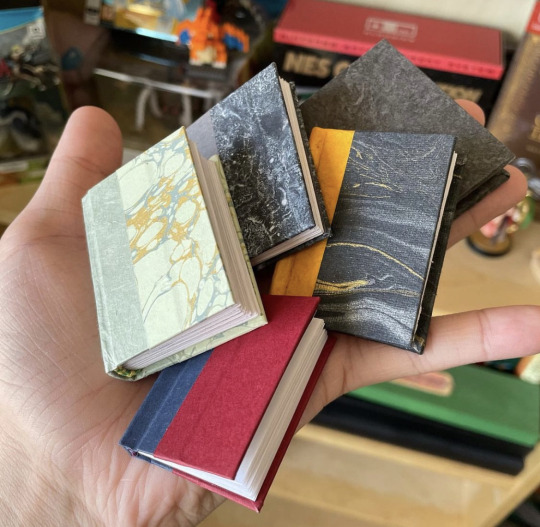

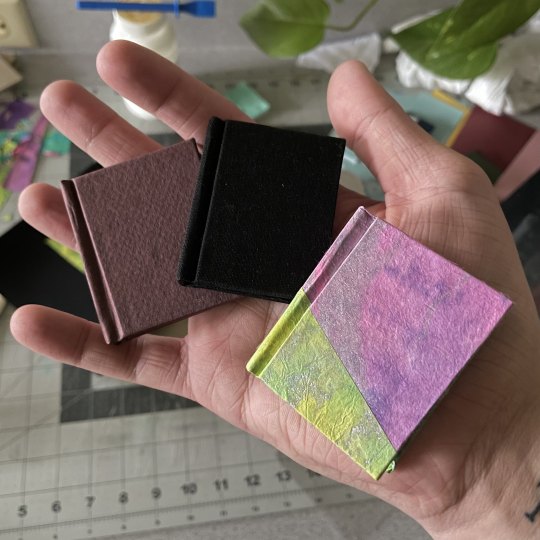
Just like with regular ficbinding, there are layers, and they are:
1 - Typesetting and Imposing
2 - Printing
3 - Cutting, Folding, and Sewing
4 - Gluing, Rounding/Backing, Endbands
5 - Building the Case and casing in
6 - BOOK
In this part we will be focusing on steps 1 and 2. Please feel free to skip to the area you're interested in most.
1 - Typesetting and Imposing
Okay, so this area has some nuances that you don't have to consider so closely with typesetting for more traditionally sized books. To me, these tiny books are not about readability, they are about novelty. As such, I do not prioritize readability. Instead, I try to achieve something that is closer to scale. That said, neither do I want these illegible. But we'll begin from the top.
You want to make a tiny book, but you're wondering, what would be an appropriate word count for a tiny book? Tiny books are the perfect medium for the ficlettes, the shorties, the one-shots. They are also perfect for the mid-sized, 10-15-20k fics, in my opinion. Here we can see,

On the left we have a fic that is exactly 12,771 words, typeset on a 1.5" x 2" (37 × 52 mm) document, with .3" margins, 6pt Garamond font, and 5pt line spacing. This book is only approaching 1/2" (13mm) wide, and only took 5 sheets of Letter paper to print.
On the right we have a fic that is exactly 1,939 words, typeset to the same specifications. This book is only 4-5mm wide, and took only 1 sheet of Letter paper.
In my opinion this format of book begins getting unruly around the 300-page mark. However, making any combination of margins, fonts size, and line spacing will yield different page results for different word counts. For example:
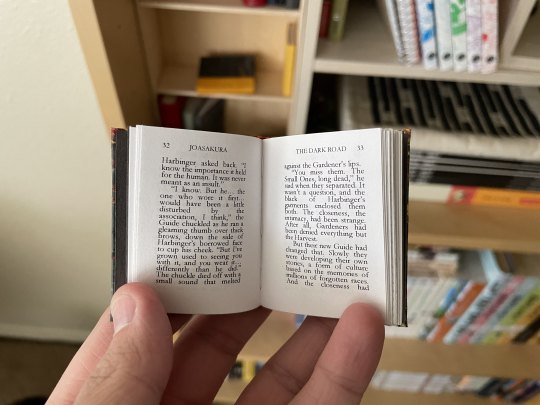
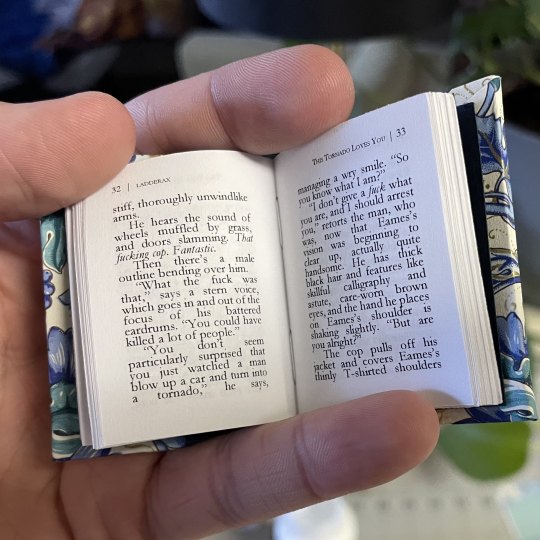
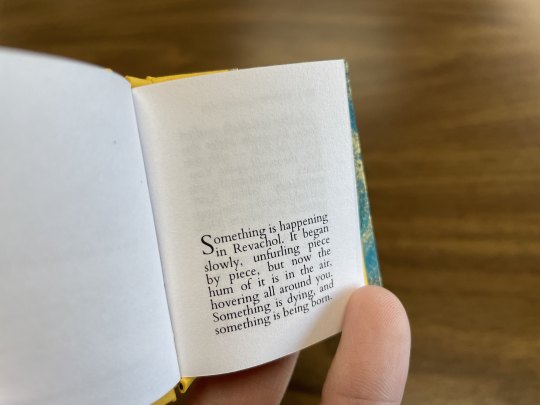
Like the above, in each of these examples I typeset in Garamond font @ 6pt size and 5pt line spacing. Typesetting on an A9 page, this is about as small as I felt comfortable sizing my font while still being legible. But notice the rivers between the words--the rivers of white space bisecting the lines, due to the Justified alignment battling the admittedly tiny work surface. At this scale, with the font at this size and alignment, those will be unavoidable. Over time I began disliking this in my own work, so I pursued a different method, which was typesetting on a quarter letter page (4.25" x 5.5" / 108mm x 140mm), and allowing my imposer to scale the PDF down.
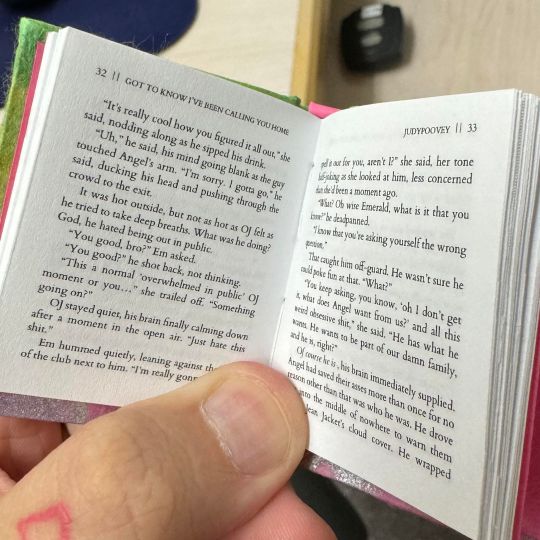
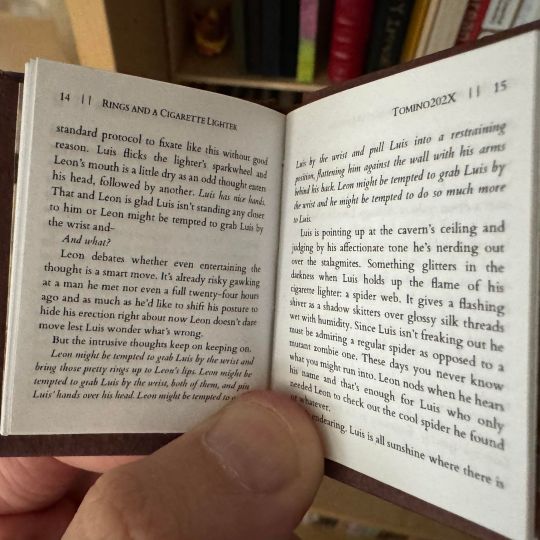
Have you ever seen anything sexier. THIS looks like a tiny book. Little to no rivers, still legible (hand-wobble), and preserves the novelty feel that I desire from a tiny book. This method of scaling down (specifically from quarter letter to A9) does change the final shape of the book, from A9 to A9-ish in this case. Specifically, from 1.5"X2" (37 × 52 mm) to 1.625"X2" (41.3mmX52mm). You're achieving something closer to a square shape, which is delightful to hold.
All this to say, you have some freedom with word count, with font size, with page size. I've done as many pages as 376 and as few as 17. The fantastic thing about tiny books--their structure will not be load-bearing, meaning--the only thing stopping you are your tastes.
Quickly, some more examples of features in a regularly sized typeset and their tiny counterpart after the imposer has scaled them down. First, scaling half-letter down to A9, a little-over 4X shrinkage:
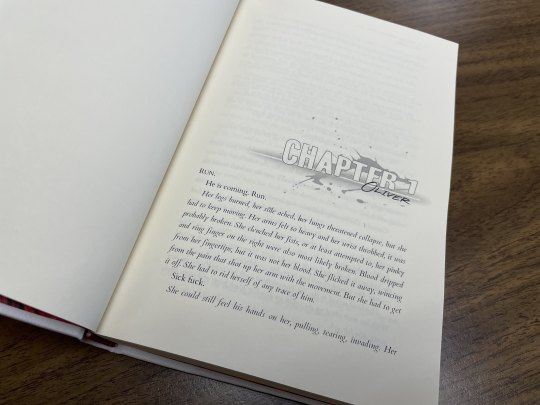
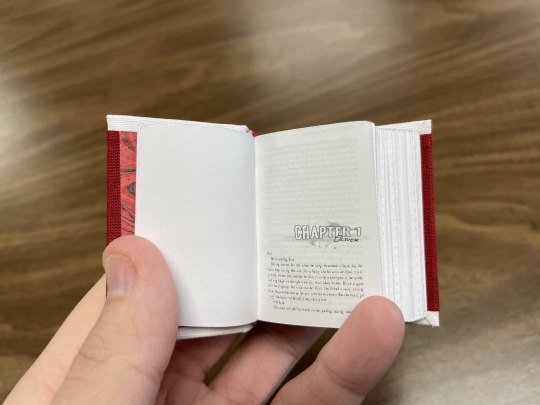
And from B6 to B9, smaller by 3x:

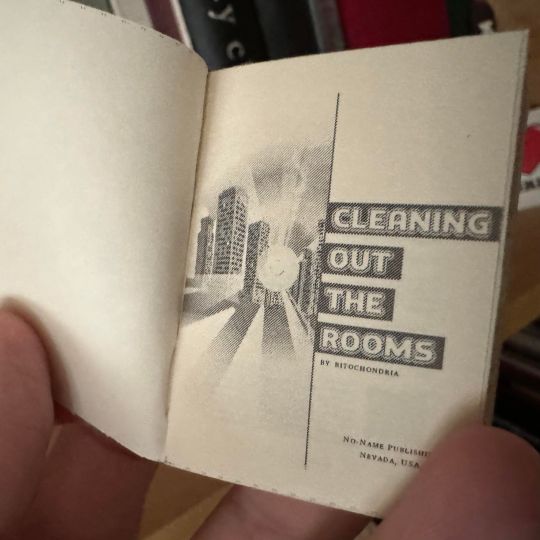
You notice the compression of every element, and too how entirely unparcable the text in the first example is, sometimes not horrible, sometimes very. Make your decisions dependent on your tastes!
You have decided on the fic you'd like to bind into a tiny book. I will be using my own fic as the typesetting example, and I will be using Word 365 for PC. I'm sure many of my pointers during this process might not apply 1-to-1 if you are using a different word processing software, but hopefully you can adapt the concepts to your program of your choosing.
Kay, next you will do your typesetting. Since this is not a typesetting guide I'm trusting that you have your preferred methods, but I will go through my key steps for setting up a tiny typeset:
First, for every typeset I delete each default Style, create mine own, and dictate the document size. For this example I will be doing my preferred quarter letter method, setting the custom page size to 4.25" wide and 5.5" tall, and .5" page margins all around (except Gutter; leave 0"). On the Multiple pages dropdown I will select Mirror margins (however, as all my margins are the same size, this is redundant, though may not be the case for you). My body text style will be Cardo font @ 11pt size and Exactly 15pt line spacing, with a .2" first line indent and Justified alignment.
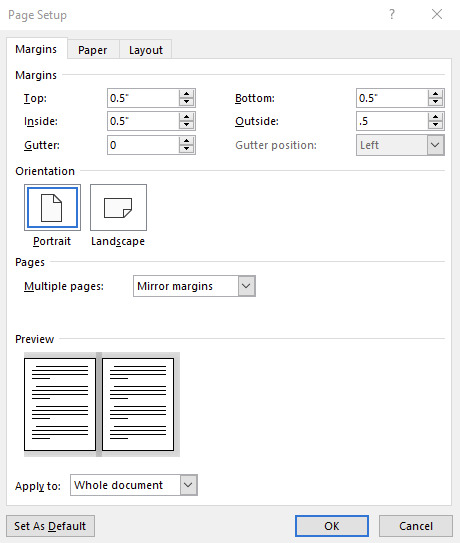
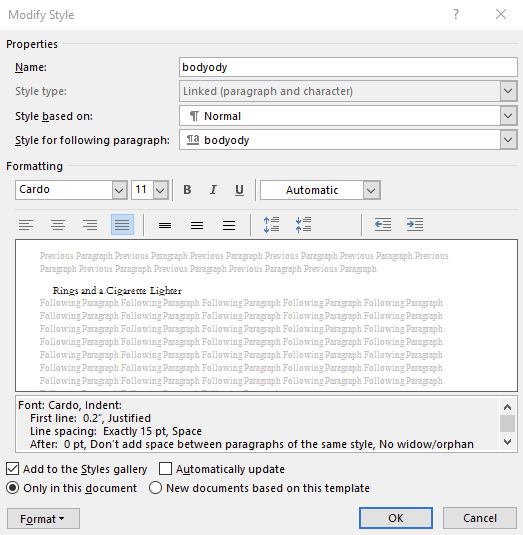

You can use whatever body font you like, I only encourage you to do many many test prints to refine your preferences. Your favorite font for half-letter books might not translate to tiny books. After ~30 tiny books I've found I like Cardo at this size and spacing. And if you're using A-paper sizes, consider doing quarter A4 instead of quarter letter, which is technically A6--4.1"X5.8", or 105mmX148mm. Follow your heart~~nyah 🐱♥
Now I will go to my fic and download the HTML file. I hugely prefer copying from the HTML file rather than the browser itself. It kind of standardizes any goofy formatting that might try to make its way over otherwise, while still preserving the italics and bolds, etc, and makes for an easier editing process. It was important I made my body Style in Word first, so that once I paste the text into my document that Style is automatically applied in one fell swoop (if not, you can change that in your Word settings. Advanced -> Cut, copy and paste -> Merge Formatting. It is a huge time saver.)
Now you've gone through your typesetting process, you have a liddle quarter letter Word document that you're happy with. Gets real close to you. Listen to me--listen, you're going to Export as PDF. Not Save As PDF. Not Print to PDF. Export. It's in--listen--it's in File, then Export, then Create PDF/XPS. You need to Export. Especially if you selected Bookfold instead of Mirror margins in your page settings because we need an unimposed PDF in order for this to work right and exporting to PDF is going to solve 99% of your pdf formatting woes with Word. Okay, I love you 👨❤️💋👨
Now, your EXPORTED pdf should look something like mine. Straight, unimposed.
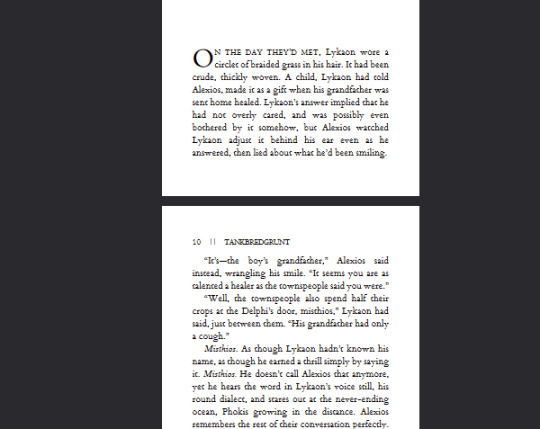
Now what we're going to do is take this PDF back to my penthouse and freak it. Go to this link for the Renegade Bindery-created and -curated imposition tool. This has been will be is such an incredible FREE asset to you, maintained by a crew of intelligent, skilled Renegade Bindery members who understand the importance of community and accessibility. If you find someone hiding this link behind a paywall of any kind it is not with the creators' permission, so shame on them.
Anyway I will be assuming that you know what imposing your document means. If you've never used this site before, it's very straight forward, and here are my settings for making Tiny Books.
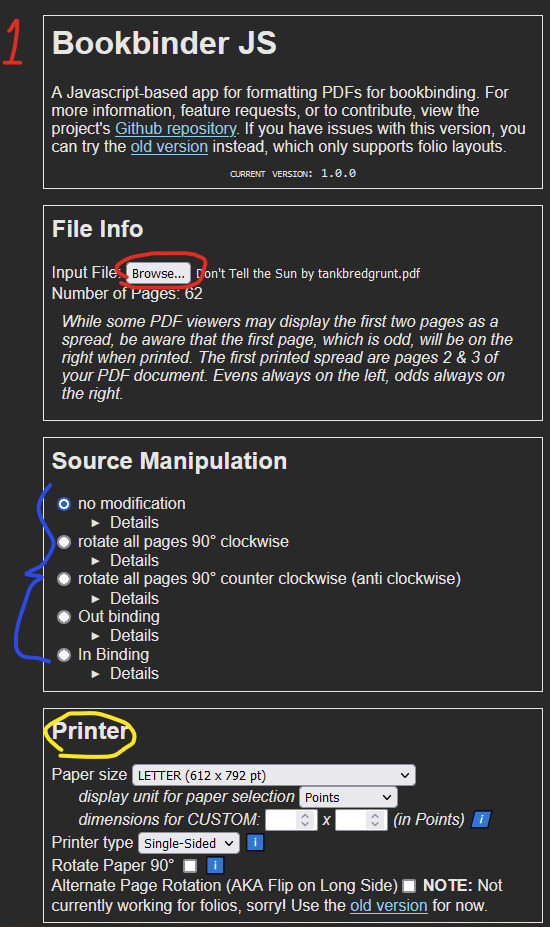

1 - Upload your unimposed exported pdf.
2 - ignore
3 - Select the paper size you will be printing on. This is not the FINAL size of the book, this is what paper you are printing on. These instructions are for Letter sized paper. Don't change any of the other settings right now, I will explain more about the Single-sided vs Duplex option in a bit.
4 - Skip aaalllll the way down to Signature Format. Under Wacky Small Layouts, click on the bubble next to Little. You'll notice there are a lot of options here. I encourage you to play with these settings later on as well, there are so many things you can make with this tool.
Once that's done, scroll down to the very bottom. You'll see the Signature Info area, telling you the results of your imposition. In the case of using the Little option we've selected, 1 sheet of our paper will make 40 book pages. 3-signature-sets of 3/3/4 folio configuration. That's a lot of pages per page.

Anyway for our document today it will cost us 2 sheets of Letter paper, and will make 6 signatures. Math says that's 80 pages. Now, you may be concerned because your typeset PDF is not formatted in a number equally divisible by 40. And why would it be. The imposer is doing that math for you in the background, organizing your pages regardless. In my case, my finished typeset is 62 pages, which means that from my second page, I will only be using my 3 folio segments, and discarding the 4 folio segment. This will make more sense later. Click the Generate button, and save the zipped folder wherever you want. Don't change the name of it.
Unzip that baby, and inside you'll notice 2 files--(filename).pdf_little_packed_backs, and .pdf_little_packed_fronts. Appropriately named as one file contains one side of the sheet that will be printed, and the other file the other side.

And when you open them up, they will look like:
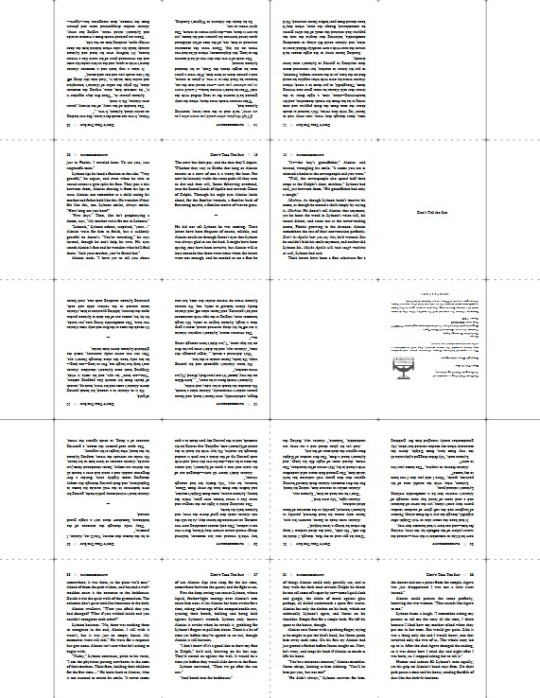
2 - Printing
We are manually duplexing this bad boy, because working at this scale amplifies and compounds every millimeter of difference. Manual duplexing will keep printer skew to a minimum, as the printer will not have to perform gymnastics in order to print on the reverse side of your page. Here are some examples:

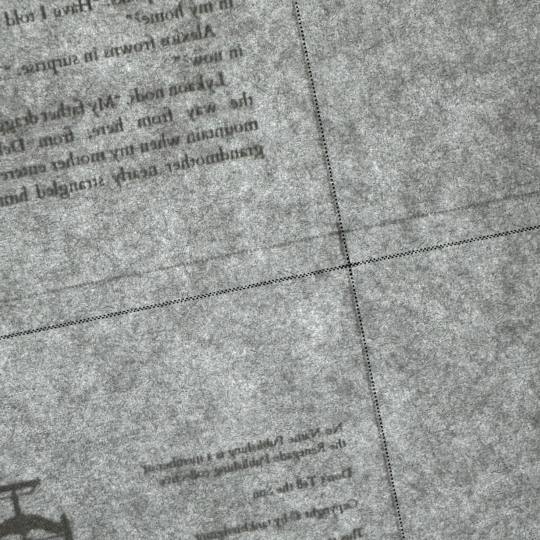
Two auto-duplexing examples of skew, one horizontal and one vertical, dependent on which direction my paper was loaded into the feeder. There is significant skew. Not a horrible issue on full-sized books but these will matter much more on our tiny books, the key issue being that we do not have much to work with in the margins department. Trimming 5-6-7mm of margins of your half-letter sized textblocks might not be much of an issue; however, here, in order to remove all the trim lines during the cutting process, you will be significantly impacting the margins of your tiny textblock.
Now here is an example of the skew from manual duplexing:
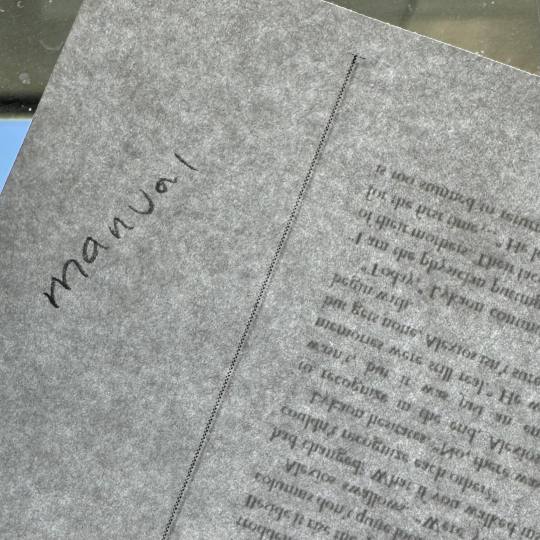
MUCH subtler. Your skew with manual duplexing will range from this--less than .5mm--to no skew at all, and you will have to cut off far less of each page to remove the trim lines, maintaining the consistency of appearance of your tiny, beautiful pages. This is why during step 3 of the imposing process we selected Single-sided (which is MANUAL duplexing), and not Duplex (which is AUTO duplexing) appropriately. This will result in you either getting two files for manual duplexing, or one auto duplexing file.
Your next consideration when it comes to printing your liddle book will be whether you want to use an inkjet printer or a laser printer. I've until recently only had a laser printer available to me. I can say after about 6 or 7 little books on an inkjet printer that I prefer the laser printing on tiny books. Here is an example of why:

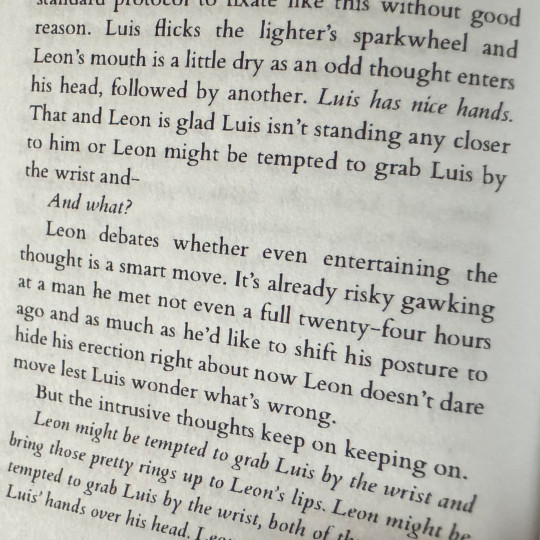
On the left you have a tiny book printed from an inkjet printer printed on the highest quality setting, and on the right is a tiny book printed from a laser printer. These were both printed at the same scaling, same font size, same line spacing, everything. The inkjet printer, printing at this scale, introduces pretty glaring feathering on the letters, whereas the laser printer is crisp as can be. I've said before that to me tiny books are more for novelty rather than readability, however I do still want to make out the word I'm looking at, you know what I mean? For this reason I prefer printing my tiny books from a laser printer. Use what you got though, you'll get a tiny book regardless. Make sure you're flipping on the short edge with these tiny books too, and double check to make sure your page numbers line up. And when you're done you got...
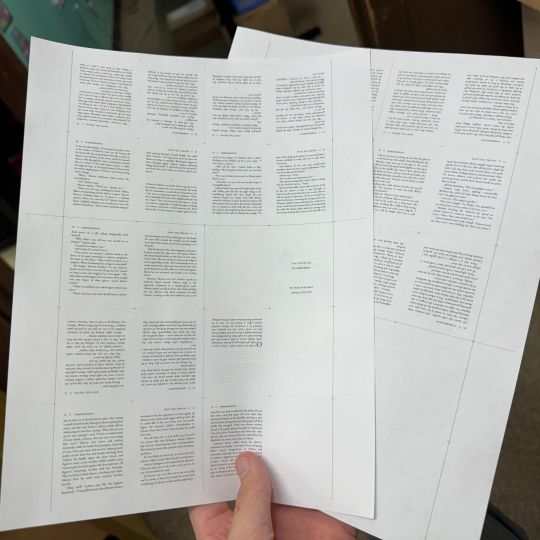
BOOK(-adjacent).
Continue on to part duex.
232 notes
·
View notes
Note
I made the mistake, after episode 7 of the acolyte, to look through the tags (I’ve given up on Reddit for sw discourse lol) and there are so many bad takes out there. It’s like people watched a different episode. I’m glad there are some good meta takes from people like you, or I’d be lost! I think nuance is dead in fandom and people just can’t see things as more than “Jedi Bad!” When there’s so much more nuance than that. Were the Jedi perfect? No! Of course not. That would be so boring. If all Jedi were always perfect, SW would be dull. It’s because they aren’t perfect that they are so compelling. That they try to do the right thing, even if it doesn’t always work out.
A quote that came to mind by Teddy Roosevelt: “It is not the critic who counts; not the man who points out how the strong man stumbles, or where the doer of deeds could have done them better. The credit belongs to the man who is actually in the arena, whose face is marred by dust and sweat and blood; who strives valiantly; who errs, who comes short again and again, because there is no effort without error and shortcoming; but who does actually strive to do the deeds; who knows great enthusiasms, the great devotions; who spends himself in a worthy cause; who at the best knows in the end the triumph of high achievement, and who at the worst, if he fails, at least fails while daring greatly, so that his place shall never be with those cold and timid souls who neither know victory nor defeat.”
Anyways, thanks for your continued good meta and cultivating a nice pro-Jedi space!
Hi! I hear you, it can be tough going into the tags sometimes (and I've given up on both Reddit and Twitter for any kind of discussion, I just do not have the time/energy for that when sometimes I still have to fight for my life on Tumblr) but I will say that the best remedy I have for that is to start posting the content you want to see! It's so satisfying to write down your thoughts just to have fun in your own space, I don't need other people nearly so much because I'm having a great time just making myself laugh or cry over my faves or nerding out over worldbuilding.
It's a bonus that I've collected a bunch of really great people around me, both ones I vibe with and ones who are chill when our vibes don't match and we disagree on stuff. I've been having an absolute joy of a time after episode 7 of The Acolyte because I've seen some great posts, I've had some hilarious conversations, etc.
And part of that is just. Letting go of a lot of fandom. I'm a lot more relaxed about the Star Wars media I consume because it's not Lucas' Star Wars, I can take or leave it as I will and, most importantly, I don't need the Jedi to be perfect to be good. So much of my need for the Jedi to be perfect once upon a time came from that any little mistake they made, ones that were completely reasonable, ones that were simply just "didn't solve everyone's problems instantly", ones that were present in other characters who were allowed to just be instead of being raked over the coals for it, and how fandom would use those as a bludgeon against the Jedi.
And that wasn't fun! So, instead, yeah, the Jedi are flawed, because any character ever is allowed to be flawed. The most cinnamon roll character ever is flawed and that's okay. Luke Skywalker is flawed. Padme Amidala is flawed. Bail Organa is flawed. Yoda is flawed. Obi-Wan Kenobi is flawed. Mace Windu is flawed. Ahsoka Tano is flawed. Leia Organa is flawed. Han Solo is flawed. Lando Calrissian is flawed. Ezra Bridger is flawed. Kanan Jarrus is flawed. Hera Syndulla is flawed. And on and on and on. If those characters can have flaws and be seen as good, well, then that's how I'm going to proceed with my Jedi faves, too. Oh, Mace wasn't bending over backwards to smile and be soft when he was having the worst day ever? That's what you're bringing me to show that he was bad actually? Babe, please, Luke started out as whiny and annoying and he's amazing, so Mace is amazing, too.
The Jedi were in a no-win situation, not fighting would mean people would die, fighting meant compromising themselves, they had to make a choice, there was no third way out, there was no secret magical answer in Star Wars, so they did what they could to the best of their ability. And it's not on them to fix everything in the galaxy, they're peace-keepers who were drafted into a war, they're not the whole of the government, they're not there to be social service agents, that's not who they are or what they're equipped for. And yet they still tried to help whenever they could.
Everyone fucks up sometimes and that's okay, it doesn't suddenly mean they're the real villain all along, because otherwise they would have to be literally be perfect to be "good" and that's just bad writing imo.
Ultimately, just take a break from scrolling through the tags if you can and join me in writing your own stuff, it's hard at first to get the words to come out the way you want them to, but with some time and energy put into it, I've found it to be so much more rewarding. <3
71 notes
·
View notes
Note
Hi! I wanted to say, I read that you are a professional editor, and think it's amazing! You also give very logical and well explained advice. I was wondering; would you say being an editor is a job you can support yourself with? I actually aspire to become one someday, but I'm not exactly sure if it's a good plan.
Thank you for your time, and I hope you have a good day/night
Hey there. Great question. It's totally possible to support yourself as an editor. I've done it, and so have other editors I know. However there are a few important things to consider before choosing editing as a career path.
Your chances of being a self-employed freelancer are extremely high. The number of in-house editing jobs in publishing are low and getting lower. While being self employed can give you a certain amount of flexibility, it also comes along with a lot of hustle and hassle, namely fluctuating income, a stupid amount of confusing tax paperwork, and the need to constantly promote yourself to clients in order to maintain steady work.
You probably won't make as much money as you'd think. Editing is one of the many skilled jobs that suffers from market saturation, which has sadly driven down the price the average client is willing to pay for editing services. I can't tell you the number of overqualified editors I know charging barely more than minimum wage for their work. Personally I've stuck to my guns about charging what I'm worth, but I've sometimes suffered by not having as much work as my colleagues who charge less.
Robots have already chipped away at the future of editing as a human occupation, and will continue to do so at exponential speed in the years ahead. They will never obliterate the job completely, as there will always be humans who prefer to work with humans instead of machines. But the outlook will become ever bleaker as more humans compete for fewer gigs, which in turn will drive down prices even further.
If you are also a writer, editing may adversely affect your writing. I don't mean that you'll become a worse writer, quite the opposite. My editing work has brought new depths to my writing, and I'm grateful for all I've learned by working with my clients. However, editing takes time, uses creative energy, and requires staring at a screen (or paper), and personally the more I edit, the less time/creativity/screen-staring capabilities I have left for my own writing.
If you mention you're an editor, someone will troll your post for a typo, grammatical error, or misused word, and then triumphantly point it out to you in the comments. This is mostly a joke. But it does happen every single time.
I hope this hasn't been too discouraging. If you feel a true passion for editing and really enjoy the work, none of the above should dissuade you. However, if you think you might be happy in any number of occupations, I'd honestly advise you to explore other options. Choosing a career path at this point in history is a gamble no matter what, but the outlook for editors is especially grim.
If you'd like to work with writers and aren't attached to being an editor, there are a few jobs (still freelance) that I believe will survive the coming robot apocalypse. Do a little Google research about "book coaches," "writing coaches," or "book doulas." These are people who act primarily as emotional supporters and logistical helpers for writers who are trying to get their book published or self published. Some of them do actual editing, but many do not, and due to the therapeutic nature of their work I believe they will flourish longer than editors in the coming robot apocalypse.
If you do explore editing as a path, the further away you can lean from spelling and grammar (e.g. proofreader or copyeditor), the longer your skills will be useful when competing with robots. AI still struggles to offer the same kind of nuanced, story-level feedback that a human can give. (Speaking from experience here--I'm a developmental editor and have yet to see a dent in my workload because of robots.) They'll catch up eventually, but it could be a while, and as long as there are human readers, there will always be humans who are willing to pay for a human perspective on their writing. Human spell checkers maybe not so much.
Hope this helps!
91 notes
·
View notes
Text
⚜️ SOTE Impressions Survey Results ⚜️

Earlier, I cycled around a survey to get opinions on the story of Elden Ring's DLC, and 101 respondents answered!! Following through with my promise, here are now all the results as recived.
Most all of these responders are likely from Tumblr, with potentially just a few from Twitter. To my knowledge this was never posted anywhere else, so these results can likely be best considered the thoughts of a good chunk in the Tumblr sphere of players!
I've done my best to make everything sufficiently readable, but there's still quite a bit in length here, apologies. The text on the actual charts may or may not be difficult to actually read, but I've given small summaries after each question to try and mitigate this.
First, the basic demographic questions:
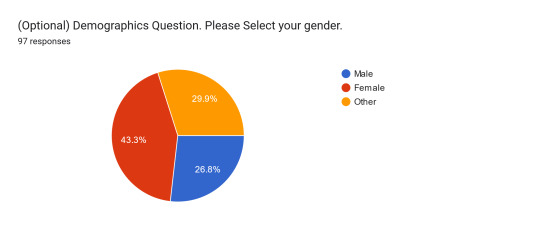
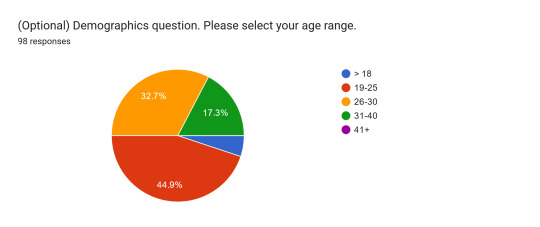
These two were optional, but almost entirely filled by all respondents nonetheless. It’s a pretty good split between gender! I half wish I’d made it more specific just for curiosity, but eh.
Age range is primarily 19-25, with 26-30 second place.
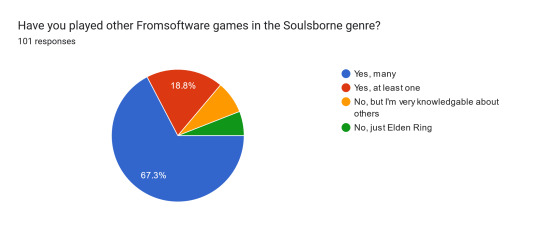
A question to determine how familiar players were with Fromsoft’s soulsborne genre and writing. Most respondents are indeed Fromsoft regulars.
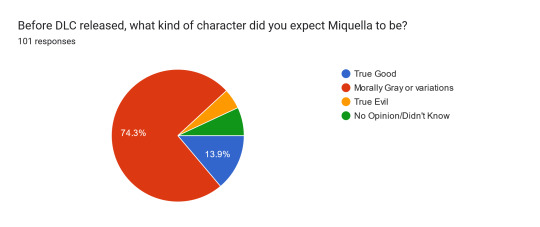
Most respondents fully expected Miquella to be Morally Grey before DLC release, with only a somewhat smaller amount expecting True Good over True Evil.
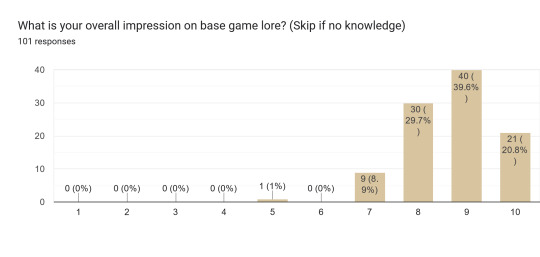
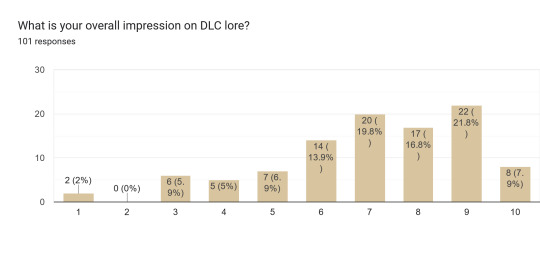
These speak for themselves. Base game lore has consistently high scores, whereas while DLC lore still has high peaks, there’s still much more of a spread haha.
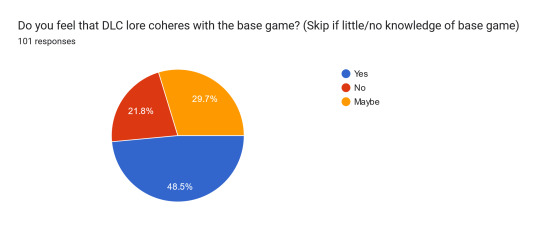
Despite it all there’s more people saying the DLC lore coheres with base game more than not??
Have you changed opinions on the DLC's lore at any time since it's release? If so, how?
No (no elaboration) - 18
No change, i feel negative- 15
No change, i feel positive- 10
Yes, I feel worse- 2
Yes, I feel better now- 18
Yes (no elaboration)- 6
N/A- 7
And wherever there’s nuance it’s usually a lot of “yeah I see the vision, but some execution could ultimately have been better.”
In hindsight this is also a question I should’ve made multiple choice…
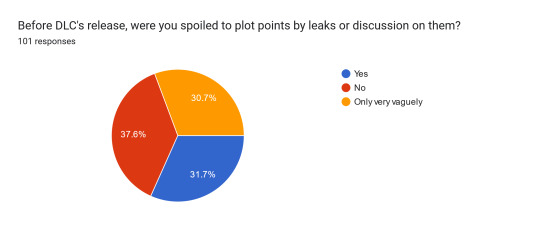
A very high chunk of people were spoiled to any degree beforehand!
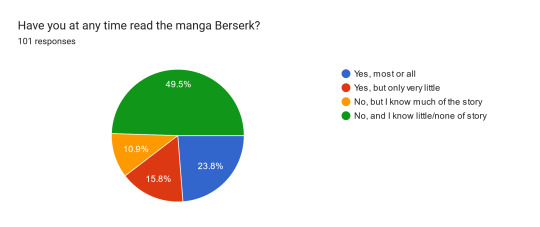
This question was due to all of the comparisons to Miquella as being similar to Griffith/initially expecting that of him before DLC. I think Berserk is a bit more popular in the Twitter/Reddit circles of fans, though.
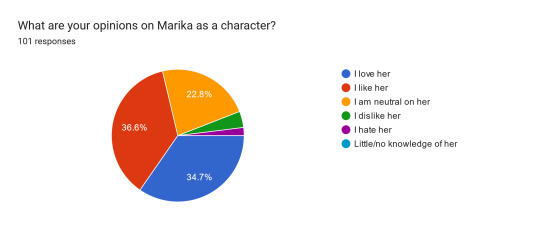
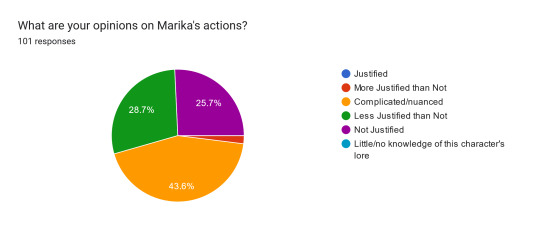
Primarily high impressions of Marika, with veeeryy low levels of believing she’s justified. Only a sliver of hate.
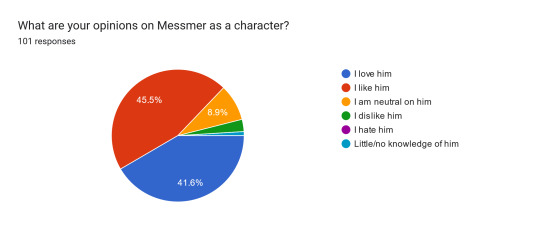
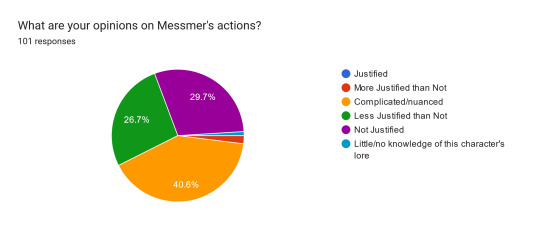
VERY high opinions of Messmer! Very small justifications of his actions, much in line with his mother.
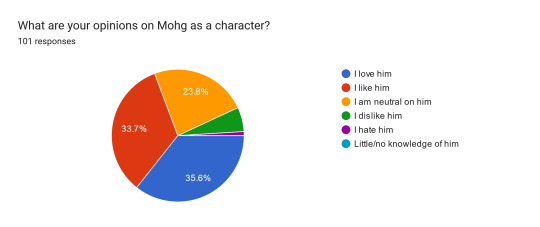
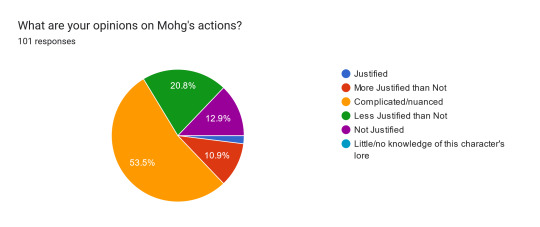
Very high impressions of Mohg overall, with a small slice of dislike, a tiny sliver of hate. People largely feel his actions are nuanced, with a small slice of more justified than not.
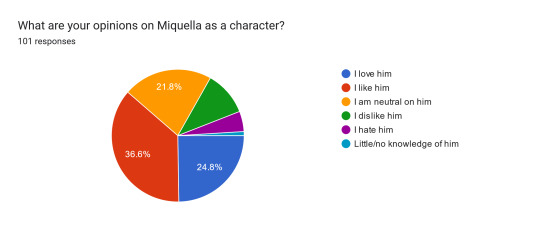
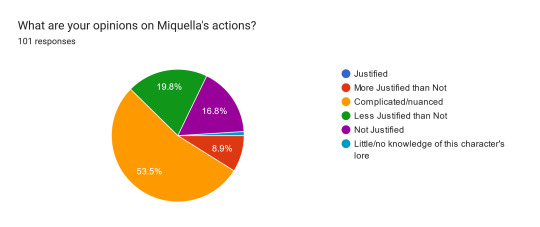
Miquella is by far the most divisive character! Albeit he still has some good chunks of Like and Love. Justification scores are much the same as Mohg, primarily complicated/nuanced.
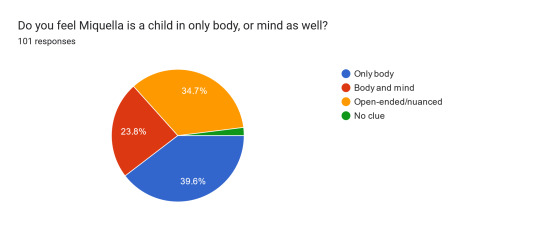
More people feel Miquella is a child only in body, with a near-equal chunk feeling it’s open-ended/nuanced.
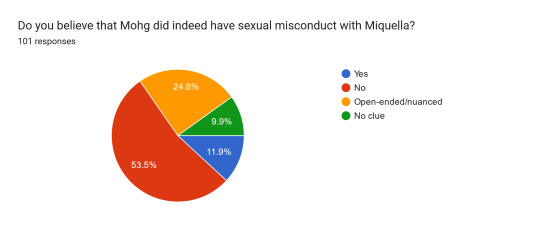
Surprisingly, most respondents do NOT believe in Mohg having sexual misconduct with Miquella… though perhaps some people felt this meant just with Mohg as a perpetrator, and not that there wasn’t iffy stuff at all? Nonetheless, this headcanon seems pretty prevalent in the community as a whole, but maybe that’s just due to all the loudest people with the crass jokes.
How do you feel about the writing choice of Radahn as Miquella's chosen king and consort?
Okay rather than try and take the stats for this one, I’m going to try and summarize the bulk of responses best as possible:
The least generous replies say this sucks ass. The most generous usually say “yeah, I see what they were going for, but the execution of this feels very flawed nonetheless.” One respondent states that the emphasis of Miquella’s plotline seemed to be on his choice of consort entirely, rather than his actual motivations or journey to get here.
Many people lament Malenia’s lack in things at all within DLC, past a single mention. A notable amount of people note that they would’ve been more accepting of the consort if it had ended up being Godwyn instead, because of the amount of weight he seemed to have in the base game lore alongside Miquella. At least one respondent laments the disservice “done to monsterfuckers everywhere” that we didn’t even get a physically monstrous boss in the end.
There’s a couple of people who go “oh yeah this makes sense for the both of them and/or I saw the signs along the way”, but they never go on to elaborate… the longest responses are always from people who are most unhappy, or are fairly understanding, but still ultimately unable to end up terribly pleased with this plot point.
Overall the reception to this plot point is decidedly poor, with the main grievances being how little foreshadowing or apparent basis there was, and how it changed the context of things in base game– such as Radahn’s first boss fight, the battle of Aeonia itself, Jerren’s wishes, and the sacrifices of all the soldiers between both armies. Even any concerns over implications of incest are honestly low priority here.
By far my personal favorite response is “I couldve written a better plot twist with three hoyrs of sleep and a coca col”, so shoutout to that one.
(Bonus) Optional because she's not relevant in the DLC. How do you feel about Ranni as a character and her actions?
I’ll be honest, this one was just because I think people’s thoughts on Ranni are a great judge of narrative comprehension. HAHAHA. But out of 91 responders to this one, most everyone cleared!
The bulk of responses are ultimately “yeah what she did to Godwyn was fucked up, but ultimately I understand it”. A few respondents note her narrative of female autonomy, and state their own reflection in this. Several note that she is selfish, but some aren’t particularly condescending with this and say that by all means, she’s just like the rest of the demigods if not still better than them.
A small handful also note that Ranni and Miquella are essentially foils to one another, where Miquella gives up everything for the sake of his Age of Compassion, but Ranni finds a means to keep her soul. It’s noted that even with his well-intentioned ambitions, he still ultimately fails as a reflection of Marika, whereas Ranni cuts herself from the cycle entirely.
A good handful of responses are little more than “hell yeah girlboss” and “fuck yeah that’s my wife” lol. On the other end, there’s a couple of responders who talk about how much they hate how she’s waifu’d, some disliking her purely because of this. Only about 2-3 responses in here are ones I’d truly consider character hate (without any seemingly justified reason) though.
Overall she’s more praised than not, with most everyone acknowledging her motivations, complexity, and role in the story. She’s often noted for her foils with Miquella, her goals of autonomy and the subsequent sympathy here from cis and trans female responders alike, with many acknowledgments that she is still by no means a saint.
And that's all! Thanks again to all of those who responded, and once more to those who've now read all the results. I still have the individual responses saved, so if I wanted I could go through and try to discern if there's any patterns related to how certain outcomes in opinion happen... but I'm tired!!! Hopefully if nothing else, this survey was a nice way to reflect and to sate some curiosity ✨
60 notes
·
View notes
Note
I noticed you have tagged posts ableist language on posts which I haven’t noticed the ableist language in. Sometimes in further reflection I can see why you have added that tag, and sometimes not. If you’ve ever got the time/inclination, could you explain some of the more nuanced ableist language usages?
sure thing! (and obviously, trigger warning for ableist language to follow)
I know many may feel I take a pretty radical stance, but i've studied enough linguistics to know how powerful the words we use can be, even when we don't intend it in that way. so I use the ableist language tag for when people are not being ableist but are using language which reinforces ableism. this can get a bit tricky as the people who are the subjects of ableist terms may often identify with or reclaim those terms, like calling someone a cripple is ableist, but many people self-identify as cripples, like the cripple punk movement.
I think they generally fall in three categories:
intelligence: stupid, idiot, moron, etc. intelligence and iq are not real, they're eugenicist myths and insulting people's intelligence only feeds these myths and serves the ruling class. build solidarity by seeing everyone as your equal. there is no moral value to having received a better or worse education than someone else. also many of these terms come directly from eugenics, such as their classifications of types or degrees of autism.
diagnoses: psycho, dumb, schizo, bipolar etc. these are real health conditions and i shouldn't have to explain why using them as insults is deeply offensive.
saneism: insane, crazy, mad, etc. the sane/insane dichotomy, if it was ever helpful, which I doubt, has been outdated for generations. there is no medical diagnosis of 'insane', there are hundreds of mental health conditions and an infinite number of combinations which we are barely beginning to understand. but none of them have or convey a moral value. using them as insults only stigmatizes those of us who have them, to the benefit of the ruling class and detriment of solidarity.
even if you are skeptical or attached to this language I'd challenge you to try not using it. you'll find it improves your vocabulary and your speaking and writing skills. not just that but it will deepen how you think about your fellow humans.
#dietspam#dietspam answers#tw ableist language#disability 101#anarchy 101#apologies to everyone who’s asked variations on this i never got back to
144 notes
·
View notes
Note
dude...no need to be an asshole to that last anon, wtf? I can absolutely see how they read your post like that. just because you run a writing blog doesn't make up incapable of being unclear.
your shitty response was way out of line and uncalled for. maybe try chilling the fuck out and not attacking people because they read your post differently than you intended, jfc. shit like this makes me feel like I can never engage with your posts because you might fly off the handle and act like an asshole to me for not reading your post exactly they way you intended. which is pretty fucking shitty behavior on your part.
that anon made really good points, and I think they were a valid response to what you said. not their problem (or any reader's) that you don't like that that's how some of us read you post. good posts provoke conversations and discussions about nuanced topics - instead you decided to shut that down and be an asshole. grow up, and maybe take your own advice and chill the fuck out. nobody called you a racist or some shit, but you're acting like you got attacked when the only person attacking anyone here is you.
Here are my choices when people send me asks that misunderstand or misrepresent posts that I made:
I ignore them. I do this sometimes. I can and will keep doing it.
I entertain their argument and get sucked into a conversation I have no interest in having.
I tell them that they misrepresented my post and that I'm not going to engage with it.
In this case, I picked option three. Was I a bit harsh? Yeah, maybe. I'm sorry if my tone came across as more aggressive than I intended.
But I am sick of the standard reaction to me talking about things like being cognizant of what we write and trying to avoid doing harm being people telling me that it's censorship or that it's somehow infringing on their ability to write what they want, or that I'm implying that they can't ever bring up a bad or hurtful topic at all.
Because that is probably the most common type of ask that I get whenever I make posts like this. This are not even the only conflating glorifying with talking about at all and then arguing with me based on that misunderstanding reaction I have gotten in the last 48 hours.
But, and I mean this genuinely, I would like to know what I am saying that is implying that. I have read through the posts I made and tried to see where that implication might be coming across, and I can't find it. And so please, I would truly appreciate you or anyone else telling me what in my phrasing or word choice is leading to that conclusion.
Because I want to avoid saying that. That's not the argument I'm trying to make and it's never the argument I've been trying to make. And so if I am accidentally implying that somehow in what I'm saying, I want to know that and change it.
But it's not my job to engage every time someone starts arguing with a point I didn't even make.
#elumish answers#ethical writing#i am tired of people's reactions to “try to avoid doing harm” being “but what if this is actually censorship”#and so yeah i'm reacting like someone who is tired of hearing that same response over and over
34 notes
·
View notes
Text
re: 405
This is gonna be long.
First, I'm bringing this post back around to remind people that kocchi is a pronoun of ambiguous plurality.
This means that an interpretation of "we" is just as correct as an interpretation of "I." Readers may interpret it differently, but on simply linguistic grounds, they are of equal validity.
You will often see this kind of ambiguous language used in Japanese, even with characters that are forthright. The reason is one part cultural expectation that the listener will read between the lines, and one part a willingness to accept two things as simultaneously true. This exists and is frequently found in English as well, there just isn't a direct parallel for kocchi itself.
What I want most out of writing this blog, aside from personal enjoyment, is for people to understand that there can be more to a story for you to engage with, think about, and be moved by, when you step outside the boundaries of your own language and culture.
I think that is a much more interesting space to be in than a gotcha-laden approach of trying to prove something wrong or bad.
But if we are going to talk accuracy, the fact is that the fan translation many people have been upholding as superior has just as many problems as the official one. It takes just as many creative liberties, they are simply different ones.
The fan translator centered an "I" reading and, rather than using either of the two pronouns provided by the text ("OFA" and あいつ, meaning "that guy"), added a narratively-charged word ("nerd") that did not exist in the original and which (as far as I can tell) Katsuki has never used when speaking to villains. As a translator myself, I really disagree with that second choice. The official clearly missed the callback, but noticed the theme of "everyone who has faced AFO until now" and went with "we." The rest was just style over substance which prioritized edgy language to capture the aggression of the line; this falls squarely in line with what Viz has consistently maintained as its in-house aesthetic. It's disappointing, but unsurprising to me.
Fandom oscillates pretty violently between vilifying the official English release and fawning over it. Whole fan theories are built upon nitty gritty bits of the official release's phrasing; people will get excited over how homoerotic a line sounds, and it's because of how the official translator worded it, rather than any innate implication in the original Japanese.
If you do not speak Japanese, your experience of MHA is fundamentally dependent on the work of translators. I respect that everybody has their personal tastes or hopes for how the series will go, but it is deeply demoralizing as a Japanese speaker and translator to see fans who don't speak any Japanese at all act as though their opinion has the same weight of authority as people who do.
You are entitled to your preferences, but please recognize that they are based in taste, not personal knowledge. Not all Japanese translators will even agree in their interpretations, but it weirds me out that some non-Japanese-speaking fans will use this fervor to spread misinformation far and wide that proclaims as inaccurate perfectly good official translations, simply because the choices don't suit their own tastes.
The lists of "times the fan translations were better" I've seen mostly contain instances where the fan translators took greater liberties than the official release did, and some fans just happened to like the liberties that were taken.
We all reasonably hated the "best friend" fan translation of chapter 359, but somehow that isn't a point forever against fan translations the same way mistakes in the official release are?
At this point, it makes me wonder what the point of writing about linguistic nuance is, if the interest is primarily not in learning but in being told what you want to hear.
I know posting this won't win me any favor with anybody, but it's how I feel. I'm bummed about 405's last line in the official. I do hope it gets revised. But the vibes around translation details are getting decidedly unfun.
One last thought: if you well and truly want to experience MHA unfiltered, learn Japanese. I mean this sincerely, I'm not trying to be a jerk. We live in an age where it is easier and more possible than ever to acquire a new language, talk to people around the world, and absorb yourself in culture and history.
If you want to remove middle-men and develop your own relationship with a work unfettered by the tastes, biases, or choices of others, learn the language. It won't be easy, but I can guarantee you won't regret broadening your horizons and discovering even more beautiful stories in the world.
143 notes
·
View notes
Text
"Béarlachas"
I've been meaning to write this post for some time now. As a person from the Galltacht (English-speaking Ireland) living and working in the Gaeltacht (Irish-language Ireland), and operating most of my life through the medium of Irish, I can honestly say that English-language Ireland, Second Language speakers of Irish and Learners of Irish tend to have a really skewered understanding of a) what Béarlachas is, b) the different forms it takes and c) what effects/damage/meaning each of its forms holds.
Contents of this post:
•Perceptions of Béarlachas
•Loanwords Vs Béarlachas
•Different Languages, Different Sounds
•Language Purity Vs Language Planning
•Conclusion
Perceptions of "Béarlachas"
Outside of the Gaeltacht, most people's understanding of "Béarlachas", or "Anglicisation" in Irish (which I am deliberately putting between inverted commas!), is the use of so-called "English-language words" in Irish. The usual list people like to list off include:
• Fón
• Teilifís
• Giotár
• Raideo
• Zú* (see Language Purity Vs Language Planning below)
• Carr*
*The ironic thing about the last item being that 'carr' (the word for a personal vehicle) is older than the English-language word 'Car' 🚗.
Second language learners with a bit more exposure to the language deride native speakers, particularly speakers from Conamara, for "using English words and adding '~áil' at the end to make a verb". Several examples being:
• Gúgláil (Google-áil)
• Sioftáil (Shift-áil)
• Sortáil (Sort-áil)
• Péinteáil (Paint-áil)
• Vótáil (Vote-áil)
• Focáilte (F*ck-áilte)
• Supósáilte (Suppose-áilte)
(⚠️NB: it is HIGHLY SIGNIFICANT that I spelt these words in these specific ways in Irish - to be explained below!⚠️)
Other so-called "English language words" in Irish include:
• Veain • Seit • Onóir • Ospidéal • Aláram • Cóta • Plaisteach • Leictreach, 7rl, 7rl...
And what about: "Halla" or "Hata" ??
Loanwords Vs Béarlachas
Before I explain where I'm going with this, I am going to introduce some words that have their origins in other languages, like:
"Seomra" from the Middle French "chambre".
"Séipéal" from the Middle French "chappelle".
"Eaglais" from the Greek "ekklesiastes".
"Pluid" from the Scots "plaide".
"Píopa" from Vulgar Latin "pipa".
"Corcra" from Latin "Purpura" (from before Irish had the sound /p/!)
"Cnaipe" from the Old Norse "knappr".
"Bád" from Anglo-Saxon "bāt".
ALL of these words, like the ones above, came into Irish via the most natural means a language acquires new words: language contact.
The reason WHY the word gets adopted is usually -and this is very important - the word is for something that the culture of the language Borrowed From already has, which is introduced to the language Borrowed Into.
For clarification, what I am trying to say is that languages NATURALLY oppose cultural appropriation by crediting the culture they got a word from by using their word for it...
I.E. "Constructing" a new "pure" word for an item that has come from another culture, is, in effect, a form of cultural appropriation - which is why institutions such as Alliance Française and Íslensk málstöð are at best puritanical, and at worst xenophobic*.
*There is nuance here - there is a difference between institutional efforts to keep a language "pure" (re: those such right-wing English/British and American opinionists who claim that the English language itself is endangered 🙄), and language planning (which also falls under the remit of Íslensk málstöð).
Furthermore, there is also such thing as "dynamic borrowing". This is where technically a language has adopted a word from another language, but has changed its meaning/adapted it to its own need. Let us take two Irish language words for example: "Iarnród" and "Smúdáil"
Iarnród is made up by two words taken from the English language: Iarann, from English language "iron" and Ród, from English-language "road".
Together, these two words mean the English-language term "Railway" - but English has never had the term "Iron Road" to refer to this object.
Similarly, Smúdáil comes from the English-language word "smooth". Only adapted to Irish, and adding the Irish-language verb suffix creates a word which means "to iron (clothing)". 😱
Different Languages, Different Sounds
Every single language on this planet has its own sound system, or "phonology". It is VERY rare for a new sound to be introduced into a different language, and some languages are MUCH more sensitive to what speakers of another language would consider a "subtle" difference, or not a difference at all.
Now...
IRISH HAS DOUBLE THE AMOUNT OF SOUNDS AS THE ENGLISH LANGUAGE!!!!!!!
(^roughly ~ish) I am making this simplistic statement to DRIVE home the fact that what English-language speakers and Learners of Irish hear as "the same as the English", Irish speakers hear a SIGNIFICANT phonetic difference.
All consonants in Irish [B, bh, c, ch, d, dh, f, fh, g, gh, h, l, ll, m, mh, n, nn, p, ph, r, rr, s, sh, t, th] - and YES, séimhiú-ed consonants and double consonants count as separate consonants - EACH have at least TWO distinct sounds. Ever heard of that old rhyme "Caol le caol, leathan le leathan"? Well, the reason why it exists ISN'T to be a spelling tip - it's to show how to pronounce each consonant in a word - which of the two distinct sounds to say.
What I mean to say by this is that, when we adopt a word into Irish, we aren't just "grabbing the word from English and hopping a few fadas on it"; we are SPECIFICALLY adapting the word to the Irish language phonetic system.
I.E. when an Irish language speaker is saying the word "frid" THEY ARE NOT USING THE ENGLISH LANGUAGE WORD "fridge" !!!
The sounds used in the English-language word belong to the English language, and the sounds used in the Irish-language word belong to the Irish language.
As a linguist I get very passionate about this distinction - the AMOUNT of times I have come across a self-important Irish language "learner" from the East of the country come to a Gaeltacht and tell native speakers that they are not using the "official" or "correct" version of a word in Irish just GRATES me to no end. PARTICULARILY as these so-called "learners" cannot hear, or typically have made NO effort to understand phonetic differences between the two languages. (Though honestly, on that point, I cannot wholely blame them - it is a fault on Irish language education as a whole that the differences in sound are hardly, if ever, mentioned, let alone taught!)
Language Purity Vs Language Planning
Moving on, as I mentioned earlier, it is very rare for a sound to be adapted into a new language. As many Irish language speakers and learners know, there is no /z/ sound in (most of the dialects of) Irish.
And yet, somehow, the official, modern translation given for the Irish language for "Zoo" is ...
Zú
Whenever I think on this given translation, I am always reminded of a good friend of mine, a lady from Carna, who used to always talk about "Súm" meetings she used to go on to talk with friends and family during COVID.
This woman only speaks English as a second language, having only ever learnt it at school and only ever used it in professional environments. She does not have the sound /z/, and as such, pronounces words that HAVE a "z" in them as /s/ sounds, when speaking in Irish OR in English.
As such, I often wonder how An Coiste Téarmaíochta can be so diligent in creating and promoting "Gaelic" words for new things, such as "cuisneoir" instead of "frid"; "guthán" instead of "fón" (which is actually pronounced "pón" in Conamara, as that suits the sound system of that dialect better); or "treochtú" instead of "treindeáil" ... And then turn around and introduce sound and sound combinations such as /z/ in "Zú" and /tv/ and /sv/ in "Tvuít" and "Svaedhpáil" 🤢
It's such this weird combo of being at the same time puritanical with regard to certain words, dismissive in regards to vernacular communities, and ignorant with regards to basic linguistic features of the language.
(Especially when, i mbéal an phobail, there are already such perfectly acceptable terms for these kinda words, like Gairdín na nAinmhithe for "Zú; Tuitéar and Tuít for "twitter" and "tweet"; and Faidhpeáil for "Svaedhpáil".)
Conclusion
This really prescriptivist approach by Irish language institutions needs to end. Not only is it not addressing or engaging with the Irish language as it is spoken by vernacular communities, it is creating this really twisted dynamic between second-language Irish speakers who apparently "know better" than first-language and native speakers of Irish.
This is what "Béarlachas" is. Not the natural adaption of words from a language with which Irish in the present day has most contact with. Not the dynamic inventions of native speakers, and even Second-language-as-vernacular speakers, utilising all the linguistic features available to them, whether that be their own dialects of Irish, English, or whatever OTHER languages/dialects are available to them.
"Béarlachas" is the brute enforcement of English language mentalities and an obsession with "purity" onto Irish, a language that has FOREVER adopted and integrated words, features and people into itself.
Gaeilge, like Éire of old, like the Ireland I want to be part of today, is open, inclusive, non-judgemental - knowing where it is coming from, and knowing that its community is its strength and key to how it has and will survive!
#Gaeilge#Béarlachas#postáil fhada#irish language#minority languages#gaeltacht#irish vocab#tráchtas#English#Langblr#Essay
332 notes
·
View notes
Text
Toxins, Venom, and Poisons in Historical Western Medicine: How Are We Not Extinct From Doing Some Of This To Ourselves?
This piece is an involuntary piece inspired by @writing-with-sophia's awesome post "Poison list", which is an accurate and succinct list of commonly known (and ancient!) poisons, venoms, and toxins that have been and were used for causing poisoning in ancient and recent history. I wanted to write this because what struck me by their post crossing my dash was, the sheer number of poisons listed that were - and even still are - used as mainstays for healthcare around the world throughout the ages!
OBLIGATORY DON'T BE A DUMBASS PSA: If you're planning on incorporating these poisons into your HISTORICAL-era writing, it's also important to remember that many of them were used for medicinal purposes at one time, too, and it's great you're interested in learning about the subject! And also, you shouldn't try ANY of these! I will not tell you how to do it at home if you DM me, so don't! You are not appropriately trained to do it! You will harm or kill yourself and possibly your loved ones if you fuck around with any of these and it will be 100% your fault and you absolutely should feel bad bout it! I've seen some of you idiots believe 4chan posts about making home-grown crystals using recipes for actual mustard gas and seen you being wheeled into the ER on the news! I will not feel bad if you get yourself hurt if you screw around with any of these plants, elements, or animals!
Resource blog plugs and PSA over, now for the Hilariously Poisonous Medicines:
If you're writing something that's meant to take place prior to the advent of our more modern understanding of poisons, venoms, and toxins, factoring in "this is toxic to me NOW, but what about 500 years ago?" can add a lot of opportunities for interesting plot elements to your story.
These can include someone accidentally poisoning themselves with a toxic drug or substance that wouldn't have killed them if they'd handled it properly - like tansy? Grows all over the place in Europe and England? That'll kill you if you harvest it too late in the season, but it's good for intestinal parasites when it's harvested early in the year and processed right.
Did the lady's maid really kill her mistress with belladonna? Or was she trying to secretly help her mistress get rid of an unwanted pregnancy?
The protagonist's children can't survive to make it to weaning age! Is the wetnurse a poisoner, or does the milkman hide that he sells sour milk by pouring Borax into it so no one could taste it and has no idea he's killing his clients' babies?
Nuance and cultural mores regarding historical views about poisons and toxins can make writing even more fun, dynamic, and interesting! Explore 'em!
Just... please don't try any of this crap yourself. You will poison yourself, it will hurt, you will die, and you will hurt the entire time you're dying. Using OP's master list alone, here's the flip side of these lethal beasts through the eyes of our distant ancestors who believed illness was caused by "vapors", "bad air", and "imbalanced humors":
Hemlock:
Used across multiple different cultures in history. When properly administered to treat a disease, poison hemlock was used to treat asthma, whooping cough, bronchitis, joint/bone pain, muscle cramps, and insomnia. Hemlock was most often used as a sedative and antispasmodic.
Arsenic:
Arsenic is a heavy metal, and so has been used in everything from making specialty dyes for wallpapers (Scheele's green is the most infamous arsenic-based paint; Queen Victoria once had a guestroom in her palace redone with Scheele's green wallpaper. The first dignitary to stay there had to be carried out and taken to emergency care after breathing astronomical amounts of arsenic dust from the wallpaper's paint), to medicine. Arsenic was especially commonly used in history to treat skin ailments ranging from acne, to psoriasis, to syphilis sores. It was also sometimes prescribed for menstrual cramps, upset stomachs, colic, and arthritis, among many, many other things.
Cyanide:
Uh... I have literally never found any evidence of cyanide in medicine, outside of its use in modern medicine as part of certain chemical lab tests for measuring urine ketone bodies that involve no contact with a patient whatsoever. Cyanide literally works in less than a few seconds to render your entire body incapable of absorbing OR using oxygen in your lungs or already existing in your blood. Cyanide is really only good at making things that breathe not breathe anymore.
Nightshade:
There are a lot of different "nightshades", so being specific is essential here. Potatoes are nightshades. Tomatoes are nightshades. Calling anything a "nightshade" does not inherently mean it's lethally toxic. Belladonna is probably the most notorious of the "deadly" nightshades, but to this day, is still used medicinally, and would actually be seen as a health and cosmetic mainstay in historical fiction, especially if your setting is in Italy!
Belladonna is an Italian portmanteau for "beautiful woman", because tinctures (water-based drops) of belladonna were commonly used by Italian women as eyedrops to dilate their eyes and appear more attractive, aroused, and desirable. Today, belladonna's eye-dilating effects are still used by optometrists to dilate the pupils! Belladonna has been, and still sometimes is used as an NSAID, general painkiller, motion sickness treatment, asthma medication, and even as a treatment for IBS.
Ricin:
As OP said, Ricin is derived from the toxin found in Castor Beans, and is surprisingly new as an official "the only reason this is made is to make someone dead" poison. Not only is ricin a popular "nobody would think to test for this!" choice in mystery/thriller writing, but it has been used for political assassinations in real life before. Georgi Markov, a Bulgarian anti-Communist dissenter and writer, was killed in 1978 with a 1.7mm diameter ricin-coated pellet shot into his thigh muscle by an unidentified assailant using a modified umbrella as a gun. He died 4 days later.
Historically, castor OIL has been used for medicinal purposes, especially for treating constipation, inducing labor in pregnancy, and as a topical skin moisturizer. If you've ever watched the opening scene in Disney's "Peter Pan", when the childrens' mother is trying to give them a spoonful of medicine each, she's actually giving them castor oil! Castor oil tastes really bad (so much so that flavorings like cinnamon were often added to try to muffle the taste), so the childrens' reluctance and disgust at their mom making them take their medicine is very realistic for the era the movie came out in!
Strychnine:
Another lethal poison that started life as a medicine/food additive. Strychnine is no longer used medicinally at all today, but historically, it was used to stimulate the heart, treat bladder and bowel incontinence, and limb palsy. Strychnine is a deadly-powerful muscle stimulant that, as a poison, causes horrifyingly painful full-body strictures (spasms) and destroys the cardiovascular system. (Fun fact: Strychnine and hydrochloric acid were historically mixed into cheap vodka to make knock-off gin, especially during the Georgian Era in England if the brewer didn't have or couldn't afford juniper berries!)
Snake Venom:
Seriously, do your research before you write an actual, real snake species using venom they don't produce! The Big 3 Forms Of Snake Venom are: Hemotoxic, Neurotoxic, and Cytotoxic. Specific snake species exclusively generate the same kind of venom (so a hemotoxic snake will ALWAYS produce baby snakes that also make hemotoxic venom). Aristotle himself wrote in 380 BC that certain snake venoms could be applied for treating fevers, smallpox, and leprosy, and there is even some evidence in the historical record prior to the 1800s that different cultures have experimented throughout the eons with using venom for converting into antivenom, but I've never found a source citing anyone making a successful form of antivenom until around the 1850s.
Digitalis:
OP really nailed the important thing about Digitalis, and that is it's cardiac benefits for certain people - particularly for treating congestive heart failure. Vincent van Gogh was actually prescribed epilepsy medication that likely contained Digitalis, aka Foxglove, and there are some prevailing theories about van Gogh's love of bright yellow paint as being either caused or exacerbated by the symptoms associated with digitalis use, which can cause an attraction to and increased visual sensitivity to the color yellow. In several portraits, including one of his own psychiatrist, van Gogh shows subjects presented alongside foxglove flowers. Digitalis is absolutely lethal if consumed or taken without expert guidance, however, because it's the mother ingredient of Digoxin. Digoxin isn't used as frequently as it used to be a few decades ago, but it's still used and prescribed today for certain forms of heart failure and heart disease. Digoxin was also, at one time, was also sometimes used to induce chemical abortions.
Lead:
Dear god, lead. Not only is it so slow to kill you that you'll think that the only way to manage your symptoms is with more lead, but lead poisoning can be a life-long crisis for a person who is regularly exposed to it. Humans have used lead for everything from plumbing, to paint, to our cutlery, to cosmetics, to medicine. While yes, it is very possible to ingest enough lead in a single sitting to die within hours or days, most sufferers of lead poisoning experience it for years or decades before the symptoms become obvious. Some archaeologists believe that the Romans used lead cutlery because lead has a unique reaction when we lick it: when you have lead coating your tongue, it makes EVERYTHING you eat suddenly taste 10x better. I learned this myself from going target-shooting with my mom at a gun rage as a teenager, inhaled gunsmoke (which contains lead), and went for lunch immediately after. Even though I was just eating a $5 meal from In-N-Out, my burger tasted so good I thought I was gonna have to change my pants. When I asked the rangemaster at the target place about it later, he literally said, "Oh yeah, lead makes the worst cooking taste like heaven."
The ancient Romans ate a lot of rotten, spoiled, and sour food, and so lead would've made it easier to eat it back then. But the neurological effects of lead poisoning are nightmarish. It's suspected that, in America, the #1 reason we had so many active serial killers in the country from the 1940s-2000s was because of leaded gasoline. Ever since leaded gasoline was banned? Serial and random violent crime rates have dramatically gone down, especially in metropolitan cities. Ancient Rome, too, gradually became an increasingly violent city as its population went up and its reliance on lead did. We're only just now starting to figure out how toxic lead actually is, so go nuts with using it as a plot element regarding subjects like "Why Are You Like This?"
Mercury:
Mercury is also known as quicksilver, because in spite of being a heavy metal, the temperature at which it melts into a liquid is very, very low compared to most other metals. The first Emperor of China, Qin Shi Huang, was rumored to be so obsessed with the notion of immortality that he would send his doctors on doomed voyages around the world searching for a legendary substance that would, indeed, make him immortal. Legend has it that some doctors who were tasked with the job found out about the last guys, and produced mercury before Emperor Qin Shi Huang and cried, "Here it is! I got it!" so they wouldn't end up doomed to drown at sea. Qin Shi Huang became so obsessed with ingesting and medicating himself with mercury that, when his legendary tomb was being constructed, he had a small-yet-accurate-to-scale map of China+the known world about the size of a football field with every body of water full of fountains of running mercury in his burial chamber. His tomb was rediscovered in the last couple of decades after archaeologists found suspiciously high levels of mercury in the soil on top of a "hill" that had been sitting in the countryside untouched for thousands of years. It turned out to be Qin Shi Huang's long-lost tomb.
Since those days, mercury has closely been associated in early medicine as a sort of cure-all, since it literally kills anything it touches (including people). Captain Blackbeard himself, the most notorious pirate in Western history (Western specifically; google who Zheng Yi Sao was), was known or widely believed to be a syphilis sufferer, and desperately sought infusions of mercury from ships he'd capture (and the doctors onboard) to treat it, believing like everyone did that mercury could cure syphilis. It can't. They just didn't understand back then that syphilis starts off surface-level, and then eats your brain years after the initial infection.
Aconite:
Again, ridiculously toxic outside of specific medicinal applications that still aren't safe today! Aconite, or wolfsbane, has historically been used as a heart sedative (for slowing the heart), diuretic, painkiller, and even used to induce sweating. Evidence of wolfsbane being used for medicinal purposes has been spotted here and there over thousands of years throughout the Greek, Roman, and Byzantine Empires, but its original use came about in Ancient Greece for hunting and culling wolves by poisoning bait-food with it. That form of hunting died out long before the European Middle Ages, but the name "wolfsbane" stuck. Mostly because in the Middle Ages, a lot of people believed werewolves were a huge problem, and kept wolfsbane handy to deter said werewolves.
Thallium:
Today, thallium is mostly used in the production of camera and eyeglass lenses. Before its toxicity was known about, it wasn't strange to hear of thallium being used topically to treat fungal infections like ringworm. Thallium was also sporadically used in treating typhus and tuberculosis, along with a wide array of sexually transmitted diseases.
This list doesn't even touch the tip of the toxic iceberg when it comes to the sheer quantity of hilariously dangerous toxins people have, or still continue, to use for medicinal purposes! In a Victorian-era English London middle-class townhouse setting alone, there were dozens and dozens of ways to poison or otherwise harm yourself just by going about your daily life. So, if you've got a period piece you're working on, or are just bored, you can pick an exact date and time in our history and learn just how terrifyingly comfortable our ancestors were with upsettingly dangerous substances and home remedies. You can also watch a massive docuseries, called "Hidden Killers" and hosted by historian Suzannah Lipscomb, among other historians and archaeologists, which deep-dives into the hidden and unknown dangers of living in eras from Tudor-Era England, to the Post-WWII Reconstruction Age.
As a final note: I am NOT bashing Chinese or Eastern medicinal practices here, and in fact deliberately have gone out of my way to not include any references toward culturally-sanctioned medicinal practices in Eastern and Southeastern Asia. This post is specifically related to the history of WESTERN medicines and their associated history. I am not, nor have I ever been, a doctor of any traditional Eastern medicinal practices, and do not pretend to know better. Sinophobes are unwelcome in my blog space.
#creative writing#historical medicine#writing reference#poison#toxins#long post#very long post#really long post#writing-with-sofia#sinophobes dni#if i've offended the OP of the first post with this i sincerely apologize#i got excited and it gave me a case of diarrhea-level infodumps
107 notes
·
View notes
Text
I've seen the same post a hundred times now. Sometimes it's a few days old, sometimes it's from years ago, but it's always the same. Some anti posts about how they don't understand how anyone can like Snape because he was so awful, and then there's a long reply that goes something like, "imagine this happens to you, and then this, and then this" to describe Snape's experience. Sometimes there's some James Potter hate thrown in.
Look. You can go through describing a character's entire experience but you don't really need to. Here's the thing that antis don't understand:
For all her faults (and they're big, bigoted ones) Rowling understood a really integral part of the human experience and conveyed it through Snape. Everyone needs love and to feel accepted. It's that simple. Snape became a Death Eater to seek acceptance (Rowling has confirmed this, though I can't remember the source - whoever wants to add it please do), because it was the only way he could find any.
Snape's understanding of morality, like everyone's, is subjective. Some readers understand this and some don't. When faced against a morality that says there is good and bad in the world, everyone makes choices based on their personal experience. Context is everything. Someone who experiences pain and suffering will not see the person inflicting it on them as moral. That's it. 'How can this person be good when they caused me so much suffering?' = human psychology. Most of the people who think 'I'm a bad person and deserve this' have been gaslit and abused into thinking so, because it's not a natural reaction - it's one that has to often be socialized into someone at a young age, exactly because it's not natural. Everyone is the hero of their own story; no one sees themselves as a villain, because they see the valid aspects of their own perspective.
You can write essays on how vulnerable people needing acceptance is what cults and fascists exploit to recruit vulnerable people, or on how the standard anti's un-nuanced reading of Snape both ignores canon and displays a disturbing lack of empathy or compassion, but at its core it just boils down to context. From Snape's perspective he experienced cruelty, therefore the people inflicting it must be cruel. Again, it's that simple. He was a person, like any other, except he was fictional so he wasn't even real. On the flip side is James Potter, who, for all his faults, didn't get to live long enough to get a chance to change and grow unlike Snape, and I think the Snapedom also needs to acknowledge that.
They're fictional characters representing things an author wants to say, not sports teams, not martyrs, and not all good or all bad emblems that define your identity depending on how you feel about them. It's depressing how much time is wasted arguing with bullies and trolls whether from the Marauders fandom or just random antis. I literally can't find more than three blogs to follow without this argument coming across my feed daily. I know the Snapedom is Not OK™ and that's kind why we're all here, and I know that my take is super unpopular but like Snape, I don't care what others think: this fandom has been having the exact same argument for years and nothing has changed. There's fanart and meta and fic and so much content out there appreciating this character, you're not going to change an anti's mind who's deliberately trolling in the tags, so why are you trying? What are you getting out of it? What does it give you? It's exhausting just scrolling past it.
#The thing about morality is that it's subjective#the religious leader who's a beacon of moral purity to their congregation#is a source of selfishness and pain to someone they abuse in secret#is that abuse victim immoral for rejecting the values the religious leader represents?#the congregation might think so because their definition of morality relies on the religious leader being a moral guide#the victim might not think so though because how can something be righteous if it causes suffering#look this is just an example of how perspectives can vary and I know there are more possible takes on that example#my point is that the idea that there's no clear 'good' and 'evil' there's only power/what you do with it is actually how psychology works#'good' to one person can be pain to another#'scourgify' is an innocuous household spell that cleans stains until it's used to waterboard someone#context matters more than labels like 'light' and 'dark' magic
56 notes
·
View notes